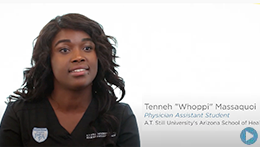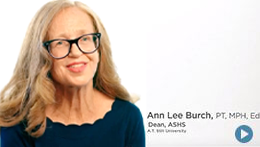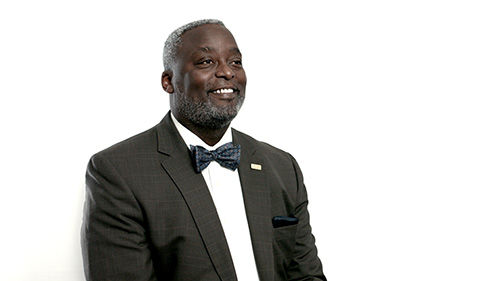Physician Assistant Degree
Physician Assistant Degree
Master of Science in Physician Assistant Studies - Arizona
The Department of Physician Assistant Studies at A.T. Still University teaches the art and science of medicine steeped in the osteopathic tradition of body-mind-spirit care for the whole person. Students grow into their profession in a learner-centered environment through face-to-face instruction, didactic clinical experiences, year-long clinical procedures and history and physical exam laboratories, regular SPE (Standardized Patient Experience) using standardized patient actors, and small group application learning lab all before their year of supervised clinical experiences working in clinics and hospitals.
Through a partnership with the National Association of Community Health Centers (NACHC), we are training whole-person-care, community centered practitioners through year-long clinical experience at a CHC for a selected portion of the class. Our graduates strive to provide culturally and spiritually competent primary care where and to whom healing is needed the most at one of our partner Community Health Centers across the country.
Prospective students who build relationships with CHCs prior to applying may qualify for advance consideration as an applicant through our Hometown Scholars program.
The residential, entry-level physician assistant master’s program in Mesa, Arizona, prepares students to serve their community as primary care providers through on-campus and clinical training throughout the 26-month program. The ultimate focus of ATSU PA education is to serve the underserved communities with competent, compassionate care.
Who We Are
The PA program aims to produce providers who will enter primary care and needed specialties as listed below:
- Family medicine
- General internal medicine
- General pediatrics
- Women’s health
- Behavioral health/psychiatry
We particularly encourage graduates to work in communities and areas where they can serve the underserved. To assist in achieving this end, we have partnered with NACHC to integrate student clinical experiences in areas of need. Students who wish to attend the ATSU PA Program should be willing to relocate to any of our community partner locations for their clinical experiences. The program does not provide international clinical experiences.
Didactic Curriculum:
An average week consists of: classroom lecture, interactive learning, laboratories and skills, Application Learning Lab (ALL), and Didactic Clinical Experiences (DCE). While a majority of the time is spent in lecture, the students engage in interactive activities such as: small group break out sessions, game-based learning, polling, and student led presentations.
 Related Videos
Related Videos
Mission, Vision, and Goals +
-
Mission
The A.T. Still University Department of Physician Assistant Studies provides a learning-centered education that develops exemplary physician assistants who deliver whole person healthcare with an emphasis on underserved populations. The program is deeply committed to fulfilling this mission.
Vision
The A.T. Still University Department of Physician Assistant Studies will be the nation’s leading provider of competent physician assistants who will serve populations in need by providing care to the body, mind and spirit.
Goals
Program Goal Measurements of Success 2021-2022 2022-2023 2023-2024 2024-2025 1. Recruit and matriculate a culturally diverse class of students. Recruitment presentations with partner undergraduate institutions at HBCUs, HSIs, Tribal Colleges, Community colleges annually. Benchmark- 6 recruitment presentations 6 23 14 20 CO2024 CO2025 CO2026 CO2027 Matriculate students from Hometown Scholars (HTS), Pipeline to Practice Program (P2P) Scholars, and Still Scholars combined each year. Benchmark: 3 or more 4 5 6 7 Each incoming class matriculates a % of students that meet the definition of economically disadvantaged, which CASPA defines by the U.S. Department of Health and Human Services poverty guidelines. Benchmark: 15% 27% 25% 23% 17% Each incoming class matriculates a % of students who are first generation students. Benchmark: 20% 28% 31% 33% 23% Each incoming class matriculates a % of students who are from isolated, rural, small or large towns. Benchmark: 20% 28% 36% 32% 37% Each incoming class matriculates a % of students who self-identify as historically underrepresented in medicine (HUG).
Note: Although the program does not use race or ethnicity in admissions decisions, it monitors self-reported demographic trends—such as racial/ethnic diversity—at the aggregate level to assess whether its mission-driven, race-neutral strategies are having the desired impact. National PAEA data show that approximately 27.4% of PA students self-identify with racial or ethnic groups historically underrepresented in medicine. The program sets its HUG benchmark slightly below that figure to ensure it can provide robust mentorship and support structures. Benchmark: 20%39% 35% 24% 27% Program Goal Measurements of Success CO2024 CO2025 CO2026 CO2027 2. Promote and provide opportunities for service to the underserved through early clinical experiences in the didactic year. Recruitment of new Didactic Clinical Experiences (DCE) opportunities in underserved annually.
Note: *Underserved includes rural or Medically Underserved Areas/Communities or providing care to persons with a lack of resources such as students at Title I schools, persons experiencing homelessness, the uninsured and the underinsured. Benchmark: 10% of new DCE opportunities in underserved per year27% 7% 0% 0% DCE capacity will be in underserved settings. Benchmark: >50% 80% 54% 65% 52% CO2024 CO2025 CO2026 CO2027 First Year Survey-Student
The program demonstrates its commitment to the department mission to develop exemplary physician assistants who deliver whole person healthcare with an emphasis on underserved populations. Minimum benchmark: 3.5/5
Strength benchmark: 4.5/5N/A 4.81 4.5 TBD First Year Survey-Student
How well did the didactic year prepare the student for clinical rotations in the following areas: Minimum benchmark: 3.5/5
Strength benchmark: 4.5/5-Cultural Sensitivity N/A 4.81 4.76 TBD -Working with Diverse Patients N/A 4.79 4.63 TBD -Cultural Proficiency N/A 4.75 4.59 TBD -Social Determinants of Health N/A 4.73 4.76 TBD -Health Disparities N/A 4.73 4.76 TBD CO2022 CO2023 CO2024 CO2025 Graduate Exit Survey The program demonstrates its commitment to the department mission to develop exemplary physician assistants who deliver whole person healthcare with an emphasis on underserved populations. Minimum benchmark: 3.5/5 for CO2025
Strength benchmark: 4.5/5 for CO2025N/A N/A N/A 4.64 Graduate Exit Survey
How prepared were you on the following CPAs - Cultural Proficiency: The ability to respect differences, value others and demonstrate behavior which enables effective interaction in all situations. (Examples: understanding cultural differences and their impact on health and healthcare decision-making; respecting, valuing and adapting to other’s perspectives; participating in diverse cultural experiences.) Minimum benchmark: 2.8/4 (3.5/5 for CO2025)
Strength benchmark: 3.6/4 (4.5/5 for CO2025)3.5 3.6 3.6 4.71 SRT Themes for Clinical Experiences in the Didactic Year - Interprofessional Education (IPE) Activities - Positive (35%)
- Clinical Experience Benefits - Positive (20%)- DCEs/Clinical Experience - Positive (45%) - DCE Value - Positive (45%)
- Practice Opportunities for Clinical Skills - Positive (40%)- DCEs / shadowing & early clinical exposure - Positive (27%) N/A: These specific questions were not included in the survey for that cohort; therefore, no data were collected. TBD: To be determined; survey items have not yet been collected. Program Goal Measurements of Success CO2022 CO2023 CO2024 CO2025 3. Promote and provide opportunities for service to the underserved through clinical rotations. Students completes at least one rotation in underserved
Note: *Underserved includes rural or Medically Underserved Areas/Communities or providing care to persons with a lack of resources such as persons experiencing homelessness, the uninsured and the underinsured. Rotations in undeserved are not a required part of the curriculum.
Benchmark: 100%100% 100% 100% 100% % of Total Rotation Capacity in Underserved Settings
Benchmark: >60%56% 60% 86.36% 64.81% New Community Health Centers Recruited Annually
Benchmark: 12 4 1 0 Graduate Exit Survey
The program demonstrates its commitment to the department mission to develop exemplary physician assistants who deliver whole person healthcare with an emphasis on underserved populations.
Minimum benchmark: 2.8/4 (3.5/5 for CO2025)
Strength benchmark: 3.6/4 (4.5/5 for CO2025)N/A N/A N/A 4.64 Graduate Exit Survey
I believe the curriculum: - Was consistent with the goals and mission of the PA program
Minimum benchmark: 2.8/4 (3.5/5 for CO2025)
Strength benchmark: 3.6/4 (4.5/5 for CO2025)3.3 3.4 3.4 4.71 Graduate Exit Survey
I believe the curriculum: - To prepare me to provide medical care to patients from diverse populations
Minimum benchmark: 2.8/4 (3.5/5 for CO2025)
Strength benchmark: 3.6/4 (4.5/5 for CO2025)3.3 3.5 3.4 4.66 Graduate Exit Survey
How prepared were you on the following CPAs - Cultural Proficiency: The ability to respect differences, value others and demonstrate behavior which enables effective interaction in all situations. (Examples: understanding cultural differences and their impact on health and healthcare decision-making; respecting, valuing and adapting to other’s perspectives; participating in diverse cultural experiences.)
Minimum benchmark: 2.8/4 (3.5/5 for CO2025)
Strength benchmark: 3.6/4 (4.5/5 for CO2025)3.5 3.5 3.6 4.71 N/A: These specific questions were not included in the survey for that cohort; therefore, no data were collected. Program Goal Measurements of Success CO2022 CO2023 CO2024 CO2025 4.Produce graduates who experience teamwork through Interprofessional Education (IPE) experiences. Number of Interprofessional Education (IPE) activities offered annually and the diversity of professions involved.
Benchmark: At least 6 IPE activities offered annually involving students from ≥3 different health professions.# of IPE Activities - 15
# of Professions Involved - 5# of IPE Activities - 15
# of Professions Involved - 5# of IPE Activities - 16
# of Professions Involved - 5# of IPE Activities - 24
# of Professions Involved - 8CO2022 CO2023 CO2024 CO2025 First Year Survey- Student
How well did the didactic year prepare you for clinical rotations in interprofessional team care.
Minimum benchmark: 3.5/5
Strength benchmark: 4.5/5N/A N/A N/A 4.7 First Year Survey-Preceptor
How well did the didactic year prepare students for clinical rotations in interprofessional team care.
Minimum benchmark: 3.5/5
Strength benchmark: 4.5/5N/A N/A N/A 4.7 CO2022 CO2023 CO2024 CO2025 Graduate Exit Survey
I believe the curriculum contained sufficient information: - To prepare me to work collaboratively in inter-professional patient-centered teams.
Minimum benchmark: 2.8/4 (3.5/5 for CO2025)
Strength benchmark: 3.6/4 (4.5/5 for CO2025)3.3 3.5 3.5 4.7 Graduate Exit Survey
How prepared were you on the following CPAs - lnterprofessional Collaboration: The ability to work effectively on an interprofessional team to deliver high quality, whole person healthcare and improve health outcomes. (Examples: recognizing the scopes of practice, roles and responsibilities of other team members; consulting with other professionals, patients and family members in implementing care; sharing responsibility for team actions.)
Minimum benchmark: 2.8/4 (3.5/5 for CO2025)
Strength benchmark: 3.6/4 (4.5/5 for CO2025)3.6 3.5 3.4 4.7 N/A: These specific questions were not included in the survey for that cohort; therefore, no data were collected. Program Goal Measurements of Success CO2022 CO2023 CO2024 CO2025 5. Promote whole person healthcare by including elements of mind, body and spirit across the curriculum. First Year Survey- Student
How well did the didactic year prepare you for clinical rotations in whole person healthcare.
Minimum benchmark: 3.5/5
Strength benchmark: 4.5/5N/A N/A N/A 4.81 First Year Survey-Preceptor
How well did the didactic year prepare you for clinical rotations in whole person healthcare.
Minimum benchmark: 3.5/5
Strength benchmark: 4.5/5N/A N/A N/A 4.41 First Year Survey-Student
The curriculum was consistent with the goals and mission of the PA program.
Minimum benchmark: 3.5/5
Strength benchmark: 4.5/5N/A N/A N/A 4.73 CO2022 CO2023 CO2024 CO2025 Graduate Exit Survey
I believe the curriculum: - Was consistent with the goals and mission of the PA program
Minimum benchmark: 2.8/4 (3.5/5 for CO2025)
Strength benchmark: 3.6/4 (4.5/5 for CO2025)3.3 3.4 3.4 4.71 Graduate Exit Survey
The program demonstrates its commitment to the department mission to develop exemplary physician assistants who deliver whole person healthcare with an emphasis on underserved populations.Minimum benchmark: 2.8/4 (3.5/5 for CO2025)
Strength benchmark: 3.6/4 (4.5/5 for CO2025)N/A N/A N/A 4.64 Graduate Exit Survey
The program demonstrates its commitment to the department’s vision in training competent physician assistants who will serve populations in need by providing care to the body, mind, and spirit.
Minimum benchmark: 2.8/4 (3.5/5 for CO2025)
Strength benchmark: 3.6/4 (4.5/5 for CO2025)N/A N/A N/A 4.67 Student Preparedness Survey- Preceptor
How well are students prepared in whole person care?
Minimum benchmark: 3.5/5
Strength benchmark: 4.5/54.4 4.4 4.3 4.72 SRT Average for BMS Courses
Minimum benchmark: 2.8/4
Strength benchmark: 3.6/43.79 3.74 3.69 3.78 SRT Qualitative Themes for BMS - Guest Speakers/Panels - Positive (52%)
- Course Content Value - Positive (38%)
- Communication drills and practice - Positive (28%)
- Course content relevance - Positive (20%)- Course Content Value - Positive (35%)
- Instructor Quality - Positive (30%)
- Communication Drills - Positive (28%)
- Interprofessional Activities - Positive (25%)- Course Content Value - Positive (35%)
- Communication Drills - Positive (40%)
- Ethics & Legal Education - Positive (33%)
- Death and Dying Lecture/Seminar - Positive (25%)
- PT/PA Collaboration - Positive (20%)- Interactive Learning - Positive (25%)
- Course Value for Healthcare Practice - Positive (30%)
- Communication Drills - Positive (60%)
- Death and Dying Lecture Value - Positive (31%)N/A: These specific questions were not included in the survey for that cohort; therefore, no data were collected. Program Goal Measurements of Success CO2022 CO2023 CO2024 CO2025 6. Facilitate a learning-centered environment that provides access to a variety of diverse, innovative educational tools. Quantity of education tools provided
Benchmark: 5+Program Provided
- Osmosis
-Simulation
-Rosh Review
-Kahoot
-OnlineMedEd
-EHR Go
Library Provided
-Clinical Key
-LWW Health Library
-UpToDate
-DynaMed
-Access Medicine
-Board Vitals
-Case Files
-Exam Master
-Essential Evidence
-Medline Complete
-PubMed
-StatPearls
-VisualDx
-Gilrot’s Atlas of Anatomy
-CURRENT
-Acland’s Video Atlas of Human Anatomy
-AHFS Drug Information
-Bate’s Visual Guide to Physical Examination
-Board Review SeriesProgram Provided
- Osmosis
-Simulation
-Rosh Review
-Kahoot
-OnlineMedEd
-EHR Go
Library Provided
-Clinical Key
-LWW Health Library
-UpToDate
-DynaMed
-Access Medicine
-Board Vitals
-Case Files
-Exam Master
-Essential Evidence
-Medline Complete
-PubMed
-StatPearls
-VisualDx
-Gilrot’s Atlas of Anatomy
-CURRENT
-Acland’s Video Atlas of Human Anatomy
-AHFS Drug Information
-Bate’s Visual Guide to Physical Examination
-Board Review SeriesProgram Provided
- Osmosis
-Simulation
-Rosh Review
-Kahoot
-Slido
-OnlineMedEd
-EHR Go
Library Provided -Clinical Key
-LWW Health Library
-UpToDate
-DynaMed
-Access Medicine
-Board Vitals
-Case Files
-Exam Master
-Essential Evidence
-Medline Complete
-PubMed
-StatPearls
-VisualDx
-Gilrot’s Atlas of Anatomy
-CURRENT
-Acland’s Video Atlas of Human Anatomy
-AHFS Drug Information
-Bate’s Visual Guide to Physical Examination
-Board Review SeriesProgram Provided - Osmosis
-Simulation
-Rosh Review
-Kahoot
-Slido
-Mentimeter
-Fullcode
-Mixed Reality Headsets
-OnlineMedEd
-EHR Go
Library Provided
-Clinical Key
-LWW Health Library
-UpToDate
-DynaMed
-Access Medicine
-Board Vitals
-Case Files
-Exam Master
-Essential Evidence
-Medline Complete
-PubMed
-StatPearls
-VisualDx
-Gilrot’s Atlas of Anatomy
-CURRENT
-Acland’s Video Atlas of Human Anatomy
-AHFS Drug Information
-Bate’s Visual Guide to Physical Examination
-Board Review SeriesTotal 25 25 25 27 CO2022 CO2023 CO2024 CO2025 Graduate Exit Survey
I believe the curriculum contained sufficient information related to searching, interpreting, and evaluating the medical literature.
Minimum benchmark: 2.8/4 (3.5/5 for CO2025)
Strength benchmark: 3.6/4 (4.5/5 for CO2025)3.1 3.2 3.2 4.5 Graduate Exit Survey
Library Resources were adequate and effective.
Minimum benchmark: 2.8/4 (3.5/5 for CO2025)
Strength benchmark: 3.6/4 (4.5/5 for CO2025)3.3 3.5 3.4 4.4 First Year Survey-Student
How satisfied are you with services of the ATSU Library
Minimum benchmark: 3.5/5
Strength benchmark: 4.5/5N/A N/A N/A 4.27 SRT Qualitative Themes for Educational Tools Kahoot - Positive (13.8%) - Noted for making reviews helpful and student engagement, especially during jeopardy-style sessions Kahoot - Positive (22.7%) - Noted for making reviews helpful and student engagement, especially during jeopardy-style sessions Kahoot - Positive (20.4%) - Noted for making reviews helpful and student engagement, especially during jeopardy-style sessions Augmented Reality (VR/AR) - Positive (40%) - Strong enthusiasm for virtual/augmented reality integration, especially in anatomy and injections. Frequently described as “amazing,” “incredible,” “Cool.”
Slido - Positive (38%) - Praised as part of interactive teaching methods, effectively used for practice questions and engagementN/A: These specific questions were not included in the survey for that cohort; therefore, no data were collected.
-
-
Accreditation +
-
A.T. Still University of Health Sciences is accredited by the Higher Learning Commission
230 S. LaSalle Street, Suite 7-500,
Chicago, IL 60604Phone: 800.621.7440 | Fax: 312.263.7462
Email: info@hlcommission.orgAt its March 2024 meeting, the Accreditation Review Commission on Education for the Physician Assistant, Inc. (ARC-PA) placed the Arizona School of Health Sciences Physician Assistant Program sponsored by A.T. Still University on Accreditation-Probation status until its next review in March 2026.
Probation accreditation is a temporary accreditation status initially of not less than two years. However, that period may be extended by the ARC-PA for up to an additional two years if the ARC-PA finds that the program is making substantial progress toward meeting all applicable standards but requires additional time to come into full compliance. Probation accreditation status is granted, at the sole discretion of the ARC-PA, when a program holding an accreditation status of Accreditation - Provisional or Accreditation - Continued does not, in the judgment of the ARC-PA, meet the Standards or when the capability of the program to provide an acceptable educational experience for its students is threatened.
Once placed on probation, a program that fails to comply with accreditation requirements in a timely manner, as specified by the ARC-PA, may be scheduled for a focused site visit and is subject to having its accreditation withdrawn.
Specific questions regarding the Program and its plans should be directed to the Program Director and/or the appropriate institutional official(s).
The program’s accreditation history can be viewed on the ARC-PA website at https://www.arc-pa.org/accreditation-history-a-t-still-az-school-of-health-sciences/
Who should I contact if I have any additional questions regarding the Program and its plans?
For specific questions regarding the Program and its plans, please contact either the Department of Physician Assistant Studies Program Director, Dr. Brittney Hulsey (bhulsey@atsu.edu), or the Arizona School of Health Sciences Dean, Dr. Ann Lee Burch (aburch@atsu.edu).
FAQs About Accreditation and what the status means for you:
- Is a program on Accreditation-Probation status still accredited?
Yes, the Program remains accredited. Accreditation-Probation is a temporary accreditation status to allow programs to make improvements more closely aligned to ARC-PA standards. - How will the Accreditation-Probation status affect the ability of the Program to support newly admitted students and current students?
The Program will continue its longstanding practice of delivering high-quality education to enable students and graduates to succeed as physician assistants. - How will the Accreditation-Probation status affect future entering classes?
The Program remains accredited and is permitted to admit students on its regular admissions cycle. - If I join the Program and start in July 2024 (Class of 2026) and graduate, will I be able to take the PANCE?
Yes. ARC-PA refers to NCCPA certification eligibility requirements which state “To be eligible for PANCE, you must graduate from a PA program accredited by the ARC-PA. PA program graduates will be deemed to have graduated from an accredited program if their PA educational program was accredited at the time of their matriculation.” For more information on Program PANCE pass rates, please visit the program website. - How will the Accreditation-Probation status affect the curriculum and clinical experiences?
There will be no changes to the length of time to graduate, course sequencing, or additional classes required as a result of this status change. The Program will continue to deliver high-quality didactic instruction and clinical experiences for every student. As supported by ARC-PA, the Program has and will continue to make improvements to the student experience to ensure students and graduates succeed and are well prepared to enter medical practices. - How does the Program’s Accreditation-Probation status affect my degree from ATSU-ASHS?
There is no effect on your degree. When you meet the degree requirements of the Program, you will be awarded a degree as scheduled. - What happens if in March 2026 the Program does not come off probation?
The Program has the full support of the University and intends to be fully accredited without probation in March 2026. In the case that accreditation is withdrawn, the Commission will determine whether the matriculated students may continue to graduation. - Will the Accreditation-Probation status affect my ability to get a job upon graduation?
No, this will not impact your ability to gain employment upon graduation. The Program is accredited, and all students who complete their degree will graduate from an accredited program. - Can I apply for licensure if the Program is on Accreditation-Probation status upon my graduation?
Yes. The primary requirements for licensure are graduation from an accredited program and NCCPA certification. The Program remains accredited. - How does the Accreditation-Probation status affect alumni of the Program?
This temporary status will not affect licensure or certification of alumni. - Why is the Program on probation?
ARC-PA provides a peer review process to ensure compliance with the accreditation standards for physician assistant education. This temporary status of Accreditation-Probation allows the Program time to make improvements and to ensure it is operating in alignment with ARC-PA expectations. Citations received largely concerned the ready availability of policies required by ARC-PA in addition to the manner in which student learning outcomes were documented and aligned with assessment in the clinical syllabi and preceptor evaluations.
Additionally, ARC-PA requires a more robust assessment of student outcomes and effectiveness of administrative processes. This effort is also already underway, as the Program has begun working with an external consultant to improve assessment processes and evaluation of how students meet Program learning outcomes and become ready for clinical practice. - If I have questions about what the Program was cited for to place it on Accreditation-Probation status, where can I find that information?
The Program’s accreditation history can be viewed on ARC-PA’s website. - How long is the temporary Accreditation-Probation status?
The temporary Accreditation-Probation status is a status initially not less than two years. That status may be extended for up to an additional two years if the Program is making substantial progress toward meeting all applicable standards but requires additional time to come into full compliance. - Will my admission to the Program still guarantee me a seat in the Program?
Yes, you have a seat in the Program as was promised to you. This temporary status gives the Program time to respond to ARC-PA. The Program will emerge stronger and continue as an award-winning program with impressive outcomes. - How can I be updated on the action items and progress being made over the next two years?
The Program remains committed to open communication and transparency during this process and will update students regularly. To this end, the Program is developing a website location where students, applicants, and alumni are updated on the Program’s action items, progress, and status. - Will students get regular updates about the Program accreditation status?
Yes, students will be updated regularly until ARC-PA’s decision in 2026. - Is there any change to the Program requirements and curriculum?
No. The program requirements and curriculum will remain the same for all current students. - Who should I contact if I have any additional questions regarding the Program and its plans?
For specific questions regarding the Program and its plans, please contact either the Department of Physician Assistant Studies Program Director, Dr. Brittney Hulsey (bhulsey@atsu.edu ), or the Arizona School of Health Sciences Dean, Dr. Ann Lee Burch (aburch@atsu.edu ).
- Is a program on Accreditation-Probation status still accredited?
-
For Prospective and Current Students: ARC-PA required standards regarding program information and policies
-
o The following ARC-PA standards are required to be readily available to prospective and/or currently enrolled students. The standard number and description are provided followed by a link to where the information can be located.o A1.02j (6th edition:A1.02g) - The sponsoring institution is responsible for j) defining, publishing, making readily available and consistently applying to students, its policies and procedures for processing student allegations of harassment.● This policy can be found on the Student Affairs website and scrolling down to the University Student Handbook and the University Catalog links. The policy can be found in the University Student Handbook in section: Student Complaints beginning on page 7 and Appendix C: Prohibition of Discrimination, Harassment, and Retaliation. The policy can also be found in the University Catalog in section: ATSU Policies beginning on page 27. Policies regarding student allegations of harassment can also be found in the Residential Student Program Guide Section: Policies and Procedures (Fair Practice and Conflict Resolution), and the department of Student Affairs website https://www.atsu.edu/department-of-student-affairs/student-complaints.o A1.02k (6th edition:A1.02h) - The sponsoring institution is responsible for k) defining, publishing, making readily available and consistently applying to students, its policies and procedures for refunds of tuition and fees.● The program's policies and procedures for refunds of tuition and fees are found on page 50 of the University Catalog.o A3.01 (6th edition): Program policies are published, readily available, and consistently applied to all students, principal faculty, staff, and the program director regardless of their locations.● The program policies are published in the Residential Student Program Guide and the University Catalog.o A3.03 (6th edition:A3.08) - The program must define, publish, make readily available and consistently apply a policy for prospective and enrolled students that they must not be required to provide or solicit clinical sites or preceptors.● This policy can be found on the website FAQs https://www.atsu.edu/physician-assistant-degree#faq #41 and in the Residential Student Program Guide in the Student Request for Specific Clinical Experiences section.o A3.04 (6th edition:A3.02) - The program must define, publish, make readily available and consistently apply a policy that PA students must not be required to work for the program.● This policy can be found on the FAQs https://www.atsu.edu/physician-assistant-degree#faq #23 and in the Residential Student Program Guide under the Student Employment section.o A3.05 (6th edition:A3.03) - The program must define, publish, make readily available and consistently apply a policy that PA students must not substitute for or function as:● instructional faculty and● clinical or administrative staff● This policy can be found in the Residential Student Program Guide under the Didactic Component Schedule section and under the Site Visits section.o A3.06 (6th edition:A3.04) - The program must define, publish, make readily available and consistently apply a policy that PA students must be clearly identified in the clinical setting to distinguish them from other health profession students and practitioners.● This policy can be found in the Residential Student Program Guide under the Dress Code section and under the Student Responsibilities/Expectations section.o A3.07 (6th edition:A3.09) - The program must define, publish, make readily available and consistently apply:● a policy on immunization and health screening of students. Such policy must be based on the current Centers for Disease Control and Prevention recommendations for health professionals and state specific mandates.● This policy can be found in the Residential Student Program Guide under the Student Health section and under the Student Requirements for completing the Clinical Component section.o A3.08 (6th edition:A3.05) - The program must define, publish, make readily available and consistently apply policies addressing student exposure to infectious and environmental hazards before students undertake any educational activities which would place them at risk. Those policies must:● address methods of prevention,● address procedures for care and treatment after exposure, and● clearly define financial responsibility● This policy can be found in the Residential Student Program Guide under the OSHA Training for Students section and under the Needlestick and Exposure Policy sectiono A3.09 (6th edition:A3.06) - The program must define, publish, make readily available and consistently apply policies that preclude principal faculty, the program director and the medical director from participating as health care providers for students in the program, except in an emergency situation.● This policy can be found in the Residential Student Program Guide under the Student Access to Faculty sectiono A3.10 (6th edition:A3.07) - The program must define, publish, make readily available and consistently apply written procedures that provide for timely access and/or referral of students to services addressing personal issues which may impact their progress in the PA program.● This policy can be found in the Residential Student Program Guide under the Student Health: Counseling Services sectiono A3.12a (6th edition:A3.11a) - The program must define, publish and make readily available to enrolled and prospective students general program information to include: a) the program’s ARC-PA accreditation status as provided to the program by the ARC-PA,● This policy can be found on the program website at: https://www.atsu.edu/physician-assistant-degree#accreditationo A3.12b (6th edition:A3.11b) - The program must define, publish and make readily available to enrolled and prospective students general program information to include: b) evidence of its effectiveness in meeting its goals,● This policy can be found on the program website at: https://www.atsu.edu/physician-assistant-degree#master-of-sciences-physician-assistant-studieso A3.12c (6th edition:A3.11c) - The program must define, publish and make readily available to enrolled and prospective students general program information to include: c) the most current annual NCCPA PANCE Exam Performance Summary Report Last 5 Years provided by the NCCPA through its program portal, no later than April first each year,● This policy can be found on the program website at: https://www.atsu.edu/physician-assistant-degree#studento A3.12d (6th edition:A3.11d) - The program must define, publish and make readily available to enrolled and prospective students general program information to include: d) all required curricular components including required rotation disciplines,● This policy can be found on the program website at: https://www.atsu.edu/physician-assistant-degree#didactic and https://www.atsu.edu/physician-assistant-degree#introduction-to-clinical-skillso A3.12e (6th edition:A3.11e) - The program must define, publish and make readily available to enrolled and prospective students general program information to include: e) academic credit offered by the program,● This policy can be found on the program website at: https://www.atsu.edu/physician-assistant-degree#introduction-to-clinical-skills● This policy can also be found on the website FAQs https://www.atsu.edu/physician-assistant-degree#faq #3o A3.12f (6th edition:A3.11f) - The program must define, publish and make readily available to enrolled and prospective students general program information to include: f) estimates of all costs (tuition, fees, etc.) related to the program,● This policy can be found on the program website at: https://www.atsu.edu/physician-assistant-degree#tuitiono A3.12g (6th edition:A3.12g) - The program must define, publish and make readily available to enrolled and prospective students general program information to include: g) program required competencies for entry level practice, consistent with the competencies as defined by the PA profession,● This policy can be found on the program website at: Program Required Graduate Competencies● The program graduate competencies are also published in the Residential PA Student Program Guide under Graduate Competencies section.o A3.12h (6th edition:A3.11h) - The program must define, publish and make readily available to enrolled and prospective students general program information to include: h) whether certain services and resources are only available to students and faculty on the main campus when the program is offered at a geographically distant campus location, and,● The program does not have a geographically distant campus locationo A3.12i (6th edition:A3.11i) - The program must define, publish and make readily available to enrolled and prospective students general program information to include: i) the most current annual student attrition information, on the table provided by the ARC-PA, no later than April first each year.● This policy can be found on the program website at: https://www.atsu.edu/physician-assistant-degree#ARC-PA%20Student%20Attritiono A3.13a (6th edition:A3.12a) - The program must define, publish, consistently apply and make readily available to prospective students, policies and procedures to include: a) admission and enrollment practices that favor specified individuals or groups (if applicable)● This policy can be found on the program website at: https://www.atsu.edu/physician-assistant-degree#faq● FAQ #11, 12, 13, 14o A3.13b (6th edition:A3.12b) - The program must define, publish, consistently apply and make readily available to prospective students, policies and procedures to include: b) admission requirements regarding prior education or work experience,● This policy can be found on the program website at: https://www.atsu.edu/physician-assistant-degree#requirementso A3.13c (6th edition:A3.12c) - The program must define, publish, consistently apply and make readily available to prospective students, policies and procedures to include: c) practices for awarding or granting advanced placement,● This policy can be found on the program website at: https://www.atsu.edu/physician-assistant-degree#requirementso A3.13d (6th edition:A3.12d) - The program must define, publish, consistently apply and make readily available to prospective students, policies and procedures to include: d) any required academic standards for enrollment,● This policy can be found on the program website at: https://www.atsu.edu/physician-assistant-degree#requirementso A3.13e (6th edition:A3.12e) - The program must define, publish, consistently apply and make readily available to prospective students, policies and procedures to include: e) any required technical standards for enrollment.● This policy can be found on the program website at: https://www.atsu.edu/physician-assistant-degree#requirementso A3.14 (6th Edition) The program publishes, consistently applies, and makes readily available to enrolled and prospective students: j) policy for student travel to required rotation sites● This policy can be found in the Residential Student Program Guide under the Travel, Transportation, Housingo A3.15a (6th edition:A3.14a) - The program must define, publish, consistently apply and make readily available to students upon admission: a) any required academic standards,● This policy can be found in the Residential Student Program Guide under the Academic Standing and Grading sectionso A3.15b (6th edition:A3.14b) - The program must define, publish, consistently apply and make readily available to students upon admission: b) requirements and deadlines for progression in and completion of the program,● This policy can be found in the Residential Student Program Guide under the Academic Progression, Professionalism Expectations, Degree Completion, Requirements for Completing the Didactic Component, Student Requirements for Completing the Clinical Component sections and Appendix H: Program Completion Formo A3.15c (6th edition:A3.14c and A3.14d) - The program must define, publish, consistently apply and make readily available to students upon admission: c) policies and procedures for remediation and deceleration,● This policy can be found in the Residential Student Program Guide under the Academic Standing, Academic Progression, Remediation, At-Risk Student Policy, Student Leave Policy and Program Withdrawal sectionso A3.15d (6th edition:A3.14e and A3.14f) - The program must define, publish, consistently apply and make readily available to students upon admission: d) policies and procedures for withdrawal and dismissal,● This policy can be found in the Residential Student Program Guide under the Academic Standing, Academic Progression, Dismissal Appeal Process and Program Withdrawal sectionso A3.15e (6th edition:A3.14i) - The program must define, publish, consistently apply and make readily available to students upon admission: e) policy for student employment while enrolled in the program,● This policy can be found on the FAQs https://www.atsu.edu/physician-assistant-degree#faq #23 and in the Residential Student Program Guide under Student Employment section.o A3.15f (5th edition) - The program must define, publish, consistently apply and make readily available to students upon admission: f) policies and procedures for allegations of student mistreatment, and● This policy can be found in the Residential Student Program Guide under the Conflict Resolution section● This policy can be found on the Student Affairs website and scrolling down to the University Student Handbook and can be found in the section: Appendix C on Prohibition of Discrimination, Harassment, and Retaliation and the reporting structure beginning on page 40.o A3.15g (6th edition:A3.14g and A3.14h) - The program must define, publish, consistently apply and make readily available to students upon admission: g) policies and procedures for student grievances and appeals.● This policy can be found on the Student Affairs website and scrolling down to the University Catalog beginning on page 29 General Overview of Grievance Processes; page 46 for grade and dismissal appeals and ASHS specific policy on page 100 for dismissal appeals.
-
Tuition/Fees/Estimated Program Cost
-
Tuition and fees for the Master of Science in Physician Assistant Studies program are structured to support the delivery of high-quality education and essential student services. In addition to tuition, students are responsible for a student technology fee and various program-related expenses, which support access to critical academic resources and ensure readiness for clinical training. Please note that tuition rates and program fees are subject to change; we encourage you to review the current tuition and fee schedule for the most up-to-date information.
-
-
What is a PA? +
-
Per the American Academy of Physician Associates (AAPA), a PA is a nationally certified and state-licensed medical professional. PAs practice medicine on healthcare teams with physicians and other providers. They practice and prescribe medication in all 50 states, the District of Columbia, the majority of the U.S. territories and the uniformed services.
PAs can:
- Take a medical history
- Conduct physical exams
- Diagnose and treat illnesses
- Order and interpret tests
- Develop treatment plans
- Counsel on preventive care
- Assist in surgery
- Write prescriptions
- Make rounds in hospitals and nursing homes
PAs’ specific duties depend on:
- The setting in which they work
- Their level of experience
- Their specialty
- State laws
-
Profession+
-
History of the profession (per the American Academy of Physician Associates)
The PA profession was created to improve and expand healthcare.
In the mid-1960s, physicians and educators recognized there was a shortage of primary care physicians.
To help remedy this, Eugene A. Stead Jr., MD, of the Duke University Medical Center, put together the first class of PAs in 1965. He selected four Navy Hospital Corpsmen who had received considerable medical training during their military service. Stead based the curriculum of the PA program on his knowledge of the fast-track training of doctors during World War II.
The first PA class graduated from the Duke University PA program on Oct. 6, 1967.
The PA concept was lauded early on and gained federal acceptance and backing as early as the 1970s as a creative solution to physician shortages. The medical community helped support the new profession and spurred the setting of accreditation standards, establishment of a national certification process and standardized examination, and development of continuing medical education requirements.
Areas of Medicine for PAs
Physician assistants (PAs) are found in all areas of medicine. They practice in family medicine, internal medicine, emergency medicine, pediatrics, obstetrics and gynecology, surgery and surgical specialties including orthopedics, psychiatry as well as many other areas. Many PAs work in settings such as education, government, administration and research.
Employment Opportunities
The most common areas of medicine (per the AAPA) include:
- Primary Care 21%
- Surgical Subspecialties 29%
- Internal Medicine Subspecialties 12%
- Emergency Medicine 10%
Employment opportunities for PAs are abundant. Many students are offered employment by preceptors on clinical rotations.
Earnings Potential
There are many resources that provide available job postings, including:
Median annual salary (per the AAPA): $120,000.
Salary varies based on experience, education, geographical location and other factors.
-
Students and Alumni+
-
Profile of the Current Cohort
Class of 2027 admissions data
- Class size: 100
- Number of applicants interviewed: 302
- Number of CASPA Applications: 2,307
- Average cumulative GPA: 3.6
- Average science GPA: 3.55
- Average age: 27
Student Services
Student Life is dedicated to enhancing life outside the classroom at A.T. Still University by providing intentional programming, leadership development, and co-curricular support. Through engagement in one of over one hundred student organizations; university-organized volunteer/service opportunities; and informal interactions with fellow students, faculty, and staff the office of Student Life helps to facilitate a work/life balance of ATSU students outside the classroom.
An example of an ATSU student organization is the J. Louis Kettel Society. The Kettel Society is the Physician Assistant program official student organization that represents all PA students at ATSU. The society provides a social and student governing platform for PA students. For more information about how to get involved with the Society or other registered student groups please contact studentlife@atsu.edu.
-
Pipeline to Practice (P2P) Scholars+
Pipeline to Practice scholars are individuals who have been endorsed by one of our partner institutions nationally. To be considered as a P2P Scholar, the individual must obtain written endorsement from their institution and have the Faculty Advisor at the institution submit the letter Gina Hirrill-Torres at ghirrilltorres@atsu.edu.
P2P Scholars are individuals who attend an ATSU partner institution within the U.S. This program grants an automatic admissions interview to P2P-endorsed applicants who meet all minimum requirements for entry to ATSU-ASHS’ PA program. If accepted and after successful completion of the didactic year in Mesa, AZ, the student will be assigned to the CHC closest to their endorsing institution for clinical year training.
The current list of partner institutions includes:
Albany State University
Arizona Western College
Benedictine University
Dillard University
Dine College
Fresno Pacific University
Holy Cross College
Langston University
North Carolina Central University
Ponce University
Saint Augustine University
Truman State University
Still Scholars +
-
Still Scholars are limited to students attending our partner institutions. Accepted Still Scholars are enrolled into a virtual course that runs congruent with their junior and senior year. Successful completion of this course, CASPA application, and interview process will provide the student with guaranteed consideration to the ASHS-MSPA program. All application fees, travel, housing, and PA education tuition and fees are the student's responsibility. Financial Aid is available for matriculated PA students. The Still Scholar virtual course will be free of charge to enrolled students. Applications must occur after the sophomore year of undergraduate training at one of our partner institutions, but no later than August 1. After successful completion of the didactic year in Mesa, AZ, the program sends Still Scholar students to NC to complete their clinical training.
At the end of the Sophomore Year, to be selected for the Still Scholars Program, an applicant must meet the following conditions:
- Students may enroll in any major, provided that application requirements are met by the time of application.
- Students must be in the process of finishing their sophomore year of their undergraduate education, or have a minimum of two years of full-time study left in their degree program.
- Completion of at least 45 credit hours prior to applying.
- Completion of at least 50% of the following prerequisite courses for PA school by the end of their sophomore year (AP credits or college credits received prior to high school graduation cannot be counted toward pre-requisites):
- Human Anatomy with lab (recommended that course be completed within 5 years of application date), minimum 4 semester credits/6 quarter credits.
- Human Physiology with lab (recommended that course be completed within 5 years of application date), minimum 4 semester credits/6 quarter credits.
- OR Combined Anatomy & Physiology course, must have two or more semesters (each with lab) totaling 8 semester credits/12 quarter credits.
- Microbiology (with or without lab; recommended that course be completed within 5 years of application date) minimum 3 credits/4 quarter credits.
- Biochemistry (with or without lab; recommended that course be completed within 5 years of application date), minimum 3 semester credits/4 quarter credits.
- General chemistry (with or without lab; recommended that course be completed within 5 years of application date), minimum 4 semester credits/6 quarter credits.
- Psychology, minimum 3 semester credits/4 quarter credits
- College Statistics (i.e. intro course, business stats, psych stats), minimum 3 semester credits/4 quarter credits
- English composition minimum 6 semester credits/8 quarter credits OR English composition minimum 3 semester credits/4 quarter credits AND English elective, minimum 3 semester credits/4 quarter credits
- Medical Terminology, minimum 1 semester/1 quarter credits (certificate does not count must be on transcript from college/university)
- Suitable academic achievement demonstrated by the following:
a. Science GPA of at least 3.40, including all occurrences of repeated courses;
b. Cumulative GPA of at least 3.40, including all occurrences of repeated courses;
c. Have a minimum grade of a B in all prerequisite courses;
d. Maintain status as a full-time student at Still Scholar partner institutions. - Demonstrate substantial involvement in volunteer work or community service activities which exhibit a strong commitment to helping others/empathy and leadership.
- Shadow a physician assistant or work in some aspect of the medical field (paid or volunteer), and have a minimum of 250 hours of clinical experiences by the time of their application.
- Maintain good disciplinary standing at Still Scholar partner institutions as certified by the Advisor and an official university academic transcript.
- Apply to the Still Scholars Program by August 1 after their sophomore year, submitting all required application components (application, essays, exclusive agreement form, transcripts, and three letters of recommendation).
- If invited, applicant will interview at ATSU-ASHS MSPAS program via zoom and be selected by the Admissions Committee for participation in the Still Scholars Program.
During the Junior Year:
- Active participation in and fulfillment of all ATSU-ASHS MSPAS Still Scholars Program Canvas course requirements.
- Attend monthly Still Scholars meetings via zoom.
Satisfactory Progress during Still Scholars Program
To continue in good standing in the Still Scholars Program, an applicant must meet the following conditions:
- Continue satisfactory academic progress in undergraduate coursework as demonstrated by:
a. Minimum Cumulative GPA of at least 3.40, including all occurrences of repeated courses;
b. Minimum Science GPA of at least 3.40, including all occurrences of repeated courses;
c. Remain a full-time student at a Still Scholar partner institution;
d. Completion of or in the process of completing any remaining prerequisite courses (listed in C.4);
e. Meeting specific undergraduate course equivalencies for graduation, as determined by the Advisor. - Participation in community service activities consistent with the goal of entering the PA profession. Specific community service activities that a candidate may elect include:
- Service and volunteer activities which exhibit a strong commitment to helping others/empathy and leadership, especially those that benefit underserved communities;
- Engaging with some aspect of the PA field;
- Being an active member of a Still Scholars partner institution's health professions club;
- Being involved in academic enrichment opportunities, undergraduate research programs, or other PA career preparation programs.
- Participate in at least 1000 hours of clinical experiences, including shadowing, employment, or volunteer work where interaction with and direct observation of a physician assistant (unrelated to applicant) interacting with patients occurs. Shadowing at least one physician assistant is highly encouraged, and shadowing primary care physician assistants is also desired.
- Have personal integrity and sound moral character by maintaining a good disciplinary standing. This includes the avoidance of serious sanctions, criminal/civil charges, maintaining acceptable interpersonal relations with faculty and peers, showing maturity and judgment, and exercising personal responsibility in meeting commitments.
As soon as CASPA opens in late April, the final interview step requires the following:
- On track for successful completion of all Still Scholars Program requirements as noted above by the time of matriculation.
- Completion of the CASPA (centralized application service for PAs) by July 1 after completion of the junior year, and completion of secondary ATSU-ASHS MSPAS application by August 1 after completion of the junior year.
- Provide ATSU-ASHS with a minimum of two (2) letters of recommendation, including one letter each from: a Still Scholars partner institution's science faculty member of a course the applicant took and a healthcare provider;
- Meet all admission requirements and fulfill all technical standards for ATSU-ASHS MSPAS.
- Successfully participate in the ATSU-ASHS MSPAS MMI interview day in their senior year.
Still Scholar Partner Institutions:
North Carolina Central University
Saint Augustine University
Still Scholars Evaluation Form (pdf)
Still Scholars Application (pdf)
-
Hometown Scholars+
-
Hometown Scholars are individuals who live in and work or volunteer with a community health center. To be considered as a Hometown Scholar, the individual must obtain written endorsement from their CHC and submit the letter through the Hometown Scholar program. For more information, please visit https://www.atsu.edu/hometown-scholars
Hometown Scholars are individuals who work or volunteer with a Community Health Center (CHC) anywhere in the U.S. This program grants an automatic admissions interview to HTS-endorsed applicants who meet all minimum requirements for entry to ATSU-ASHS’ PA program. If accepted and after successful completion of the didactic year in Mesa, AZ, the program sends HTS students to the endorsing CHC for clinical year training. If the endorsing CHC does not have a training partnership with ATSU-ASHS’ PA program, the student will be assigned to another CHC for clinical year training.
-
Didactic and Clinical Year Overview+
-
Didactic Year Overview
Classroom lectures and labs are conducted on the Mesa campus. Lectures are generally in large group format, often with case studies, interactive quizzing, communication drills, and projects to encourage participation and collaboration with peers and faculty.
Labs are generally in smaller group format, in which students practice year-round history and physical exam and hands on skills and procedures. Under faculty supervision, students are provided robust training in bedside ultrasound. Application Learning Lab allows small groups of students to apply what has been taught through a variety of case scenarios.
Standardized patients are utilized to give “real world” scenarios and exposure in the testing environment to best prepare students for clinical rotations.
The situation room is a multi-scenario simulation that immerses students in challenging clinical scenarios to foster and enhance teamwork, critical thinking, procedural proficiency, and communication skills.
Students gain practical experience to prepare for clinical rotations by going into the community to see patients during their didactic year. Students build confidence by working closely with preceptors and patients. Examples of these didactic year clinical experiences include the following:
- Mission of Mercy
- Karate medical team
- Family Medicine
- Ears Nose Throat (ENT)
- Dental Clinic
- Various health fairs
- Denova
- PT/OT clinic
Clinical Year Overview
All students complete eight 4-week and two 8-week supervised clinical practice experiences. Students are assigned to complete these experiences at sites throughout the state of Arizona or at one of our community health center partners located in various parts of the country. Clinical Practice Experience areas include:
- Family Medicine
- Internal Medicine
- Pediatrics
- Emergency Medicine
- Women’s Health
- General Surgery
- Behavioral Health
- Elective
- Selective 1
- Selective 2
Community Health Centers (CHC) for Clinical Experiences
Community Health Centers (CHC) for Clinical Experiences Community Health Centers are the nation’s largest safety net providers of healthcare for the underserved. Select students are assigned to complete their rotations at one of our community health center partners. By being embedded in these areas for clinical rotations, it is hoped that students will choose to practice in a community of need.
Our current CHC partners include the following:
- Sun Life Health, Casa Grande, AZ
- Teche Action Clinic, Franklin, LA
- Albany Area Primary Health Care, Albany , GA
- Family Healthcare Network, Visalia, CA
- Camarena Health, Madera, CA
- Sunset Community Health Center, Yuma AZ
- Community Healthcare Center of Wichita Falls, Wichita Falls, TX
- Ampla Health, Yuba City, CA
- Golden Valley, Merced, CA
- United Community Health Center, Green Valley, AZ
- Celebrating Life, Mission Viejo, CA
- New Jersey Clinical Consortium, Passaic, NJ
A.T. Still University’s Physician Assistant Program is an entry level, 26 month course of study that leads to a Master of Science degree upon successful completion. The first 14 months of the program consist of courses that develop a strong academic foundation for clinical practice. Faculty and staff work closely with students, helping them develop professional attributes and clinical problem-solving skills necessary for efficient and optimal patient care.
During the clinical component of the program, students attend clinical rotations in several disciplines of medicine. Students are supervised by clinical preceptors and continue to advance their clinical knowledge by working directly with patients and various health care professionals.
Graduation from ATSU-ASHS PA program also requires the development of a capstone paper/project in collaboration with the faculty. The paper/project is designed for students to complete a community health improvement or quality improvement project focused on a social determinant of health specific to the community in which they are completing their clinical training.
After graduation, students take the national certification exam, Physician Assistant National Certifying Exam (PANCE).
-
-
NCCPA Pass Rates +
-
The first time pass rate for class of 2025 is 92%.
-
Attrition
-
ARC-PA Student Attrition and Graduation Rates +
-
Class of 2023 Class of 2024 Class of 2025 Maximum entering Class size
(as approved by ARC-PA)70 70 100 Entering class size 70 71 100 Graduates 66 67 94 *Attrition rate 5.7% 7.04% 7% **Graduation rate 94.30% 94.36% 94.00% The total entering class was 71 students. This total reflected one student who was in the Class of 2023 cohort that was granted deceleration in February after the full cohort for Class of 2024 had been accepted during the admissions process. This student returned to the program with the Class of 2024, resulting in a total entering class size of 71. A student who decelerated from the Class of 2024, returned in the spring in the Class of 2025 resulting in 94 graduates. *Attrition rate calculation: Number of students who attrited from cohort (decelerated + withdrawals + dismissals) divided by the (entering class size + number joining class cohort).
**Graduation rate calculation: Number of cohort graduates divided by the (entering class size + number joining class cohort).
-
Physician Assistant Faculty
-
Dean +
-
-
 Ann Lee Burch, PT, MPH, EdD
Ann Lee Burch, PT, MPH, EdD

Dr. Ann Lee Burch is the dean of A.T. Still University’s Arizona School of Health Sciences (ATSU-ASHS). Dr. Burch received her doctor of education from Columbia University, Teachers College in 2005. She received her masters of public health from Columbia University, Mailman School of Public Health in 2002 and her masters of physical therapy from Columbia University, College of Physicians and Surgeons in 1989. She was a postdoctoral fellow with the Research Group on Health Disparities at Teachers College, Columbia University. Her BA is in psychology from the University of Rochester.
Prior to her appointment as dean, Dr. Burch served as vice dean for ATSU-ASHS. She served as the chair of the Physical Therapy Department from 2008-January 2012. Prior to ATSU, Dr. Burch was the director of physical therapy at the University of Puerto Rico, Medical Sciences Campus in San Juan, Puerto Rico. She has held administrative and/or faculty positions at the International Center for the Disabled in NY, NY, Mercy College in NY, and Long Island University in Brooklyn, NY.
Dr. Burch’s area of scholarly interest and application of that interest is in knowledge, attitudes, and self-efficacy of health care providers and healthcare professional students towards underrepresented patient/client groups.
Dr. Burch is the author of a Guide to Physical Therapy (Vault Publishers) which was written to increase information access about physical therapy to both high school graduates and re-entry adults. She was a co-investigator on an NIH grant at the University of Puerto Rico exploring the feasibility of an exercise program for breast cancer survivors living in San Juan. Dr. Burch has lived in Symi, Greece, Taipei, Taiwan, Ahmdebad, India and San Juan, Puerto Rico, and is committed to research, teaching and service that further the understanding of the impact of socioeconomic and cultural variables on health.
She was a member of the class of 2014 cohort of Women in Educational Leadership at Harvard Graduate School of Education. In 2017 she was the co-PI on a Centers for Disease Control, Association for Prevention and Teaching grant exploring a population health case study format for teaching and communicating the impact of social determinants of health on health disparities. She was recently appointed a peer reviewer for the Higher Learning Commission.
-
-
-
Vice Dean +
-
-
 Marlene Salas-Provance, PhD, MHA, CCC-SLP
Marlene Salas-Provance, PhD, MHA, CCC-SLP
Dr. Salas-Provance, is professor and vice dean of A.T. Still University’s Arizona School of Health Sciences (ATSU-ASHS). Dr. Salas-Provance received her doctorate in speech science from the University of Illinois Urbana-Champaign. She received her masters of health administration from the University of Missouri School of Medicine-Columbia. She holds both a bachelors and masters in Speech Pathology from New Mexico State University.
Prior to her appointment as vice dean, Dr. Salas-Provance served as associate dean of academic and student affairs for the School of Health Professions at the University of Texas Medical Branch Galveston. She served as assistant dean and chair in the College of Education, Department of Special Education and Communication Disorders at New Mexico State University in Las Cruces, New Mexico and department chair in the Department of Communication Sciences and Disorders at the University of Montevallo (AL). She held faculty positions at Fontbonne College and St. Louis University, in St. Louis, MO.
She has made extensive professional contributions to the American, Speech, Language & Hearing Association (ASHA), serving on the Speech-Language Pathology Advisory Council, member of the Financial Planning Board, and the Multicultural Issues Board. She served as coordinator of ASHA’s Special Interest Group (SIG) 14, Communication Disorders and Sciences in Culturally and Linguistically Diverse populations and was a founding member and coordinator of SIG 17, Global Issues in Communication Sciences and Disorders. She is an ASHA Fellow and received ASHA’s highest awards for “Special Recognition in Multicultural Affairs” and “Outstanding Contributions in International Achievement.”
Dr.Salas-Provance has served as a clinical educator throughout her academic career, especially related to children with cleft lip and palate. She is a member of an international medical team with Rotaplast International and has traveled worldwide for over 15 years to provide clinical services to children with cleft palate. She implemented a program for graduate students in speech pathology to provide clinical services in Spanish to children with cleft palate in Lima, Peru. In addition to Lima, Peru she has provided clinical services in China, Bangladesh, Philippines, El Salvador, Dominican Republic, Guatemala and Venezuela.
Dr. Salas-Provance is coauthor of the textbook Culturally Responsive Practices in Speech-Language and Hearing Science (Plural Publishing, 2019) which meets the needs for training students in healthcare professions regarding practice with individuals from culturally and linguistically diverse populations. Her research is focused on attitudes towards disability by diverse populations and addressing the use of language interpreters during healthcare and educational encounters.
Over the past ten years she has lectured extensively to international audiences, both in English and Spanish, including as invited speaker for the Congreso Internacional en Trastornos de la Comunicacion at Escuela de Fonoaudiologia (Speech Language Pathology / Audiology) de la Universidad de Talca, Chile and for the Department of Otolaryngology, Hospital Nacional Arzobispo Loayza, Lima, Peru, Endoscopic Evaluation of Velopharyngeal Dysfunction. She was invited keynote speaker for the First International Congress in Speech-Language Pathology and Orthodontics in the area of cleft lip and palate in Lima, Peru.
Dr. Salas-Provance was selected for the American Council on Education (ACE) Women’s Leadership Program and attended the National Women’s Leadership Forum in Washington DC (2017) for advancing female executives in higher education.
-
-
-
Department Chair +
-
-
 Ray Pavlick, PhD
Ray Pavlick, PhD
Professor, Department Chair
Dr. Ray Pavlick has worked for ATSU since he began teaching physiology and pharmacology in ATSU’s PA program in 1997. He earned BS (1990) and PhD (1995) degrees in Physiology from the University of California-Davis. Dr Pavlick also teaches for ATSU’s Arizona School of Dentistry and Oral Health (ASDOH) and trains paramedics in the east valley of Phoenix.
He has published several articles in journals such as General and Comparative Endocrinology, The Journal of Physician Assistant Education, and The Journal of the Medical Library Association. He has also authored chapters in PANCE review books on both physiology and pharmacology. Dr Pavlick has held various leadership positions within ATSU including Associate Dean of Curriculum for the School of Osteopathic Medicine in Arizona (SOMA) and Director of Didactic Education for the ASHS PA program.
Dr. Pavlick’s primary passion is teaching, and he has been recognized for his teaching skills with several awards, including the Osmosis.org Raise the Line International Faculty Award (2020), the ATSU-ASHS Educator of the Year Award (2006) and the ASHS PA Faculty of the Year Award (2003 and 2005). Dr. Pavlick’s secondary passion is curriculum development, and he has presented workshops and research abstracts in this area at various medical education conferences around the world, including France, Scotland, Czech Republic, Netherlands, UK and Canada.
He began his role as the Chair of the Department of Physician Assistant Studies on an interim basis in June 2024 and assumed the permanent role in February 2025.
-
-
Program Director +
-
-
 Brittney Hulsey, DMSc, MSPA
Brittney Hulsey, DMSc, MSPA
Associate Professor
Brittney Hulsey DMSc, MSPAS, MS, PA-C, is a 2015 graduate of A.T. Still University’s Mesa campus PA program and a 2022 graduate of the A.T. Still University Doctor of Medical Science Program. She was born in Orange, California and grew up in southern Orange County. She moved to Arizona and attended University of Arizona where she received her undergraduate and graduate degree in physiological sciences. She worked as an anatomy and physiology professor and EMT prior to attending ATSU-ASHS’ PA program. She is the sole creator and instructor of PAss it PANCE LLC Review Course and chapter author for Lange Q&A for Physician Assistants. She has a strong background in both primary care and urgent care. She also serves as a board member for Arizona State Association for PAs. She is passionate about sports medicine, exercise physiology, cardiac health, and working with members with developmental and intellectual disabilities, and veterans. She has a strong passion for addressing social determinants of health in medicine and teaching students about this important topic. She is committed to improving health outcomes by understanding and addressing social, economic, and environmental factors that can impact a person's well being. She is passionate in empowering students to become effective and compassionate healthcare providers that will make a meaningful difference in the lives of their patients. Her teaching philosophy is to prepare the student for the road, not the road for the student.
-
-
Administration and Faculty +
-
-
 Jeffrey D. Butler, DO, FACOEP, FACEP, FAAEM, RDMS
Jeffrey D. Butler, DO, FACOEP, FACEP, FAAEM, RDMS
Medical Director
Read Bio -
 Clay Walker, PA-C, MSPA
Clay Walker, PA-C, MSPA
Assistant Professor, Director of Didactic Education
Read Bio -
 Annette Bettridge, EdD, PA-C, FNP
Annette Bettridge, EdD, PA-C, FNP
Assistant Professor
Read Bio -
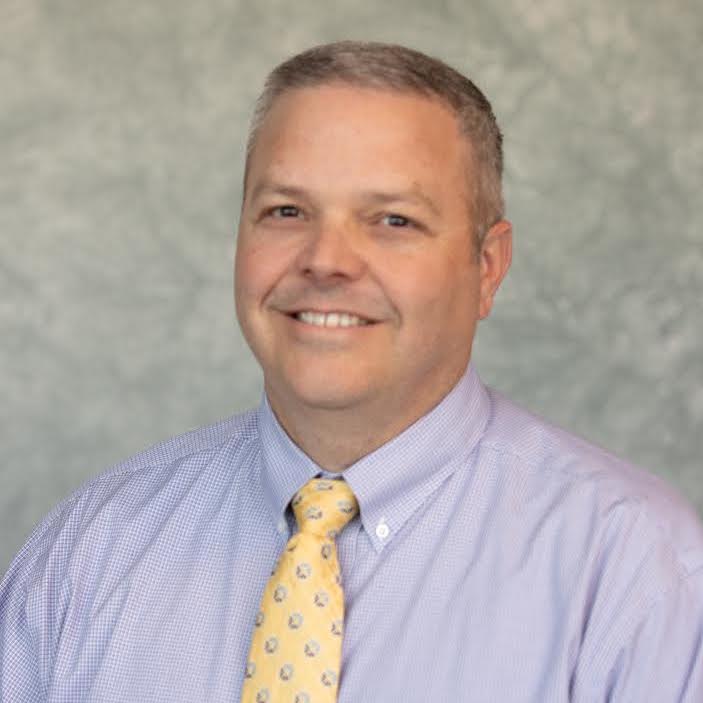 Thomas Hartman, DMSc, PA-C
Thomas Hartman, DMSc, PA-C
Assistant Professor, Director of Progression and Retention
Read Bio -
 Linda S. MacConnell, DMSc, MAEd, MPAS, PA-C
Linda S. MacConnell, DMSc, MAEd, MPAS, PA-C
Associate Professor
Read Bio -
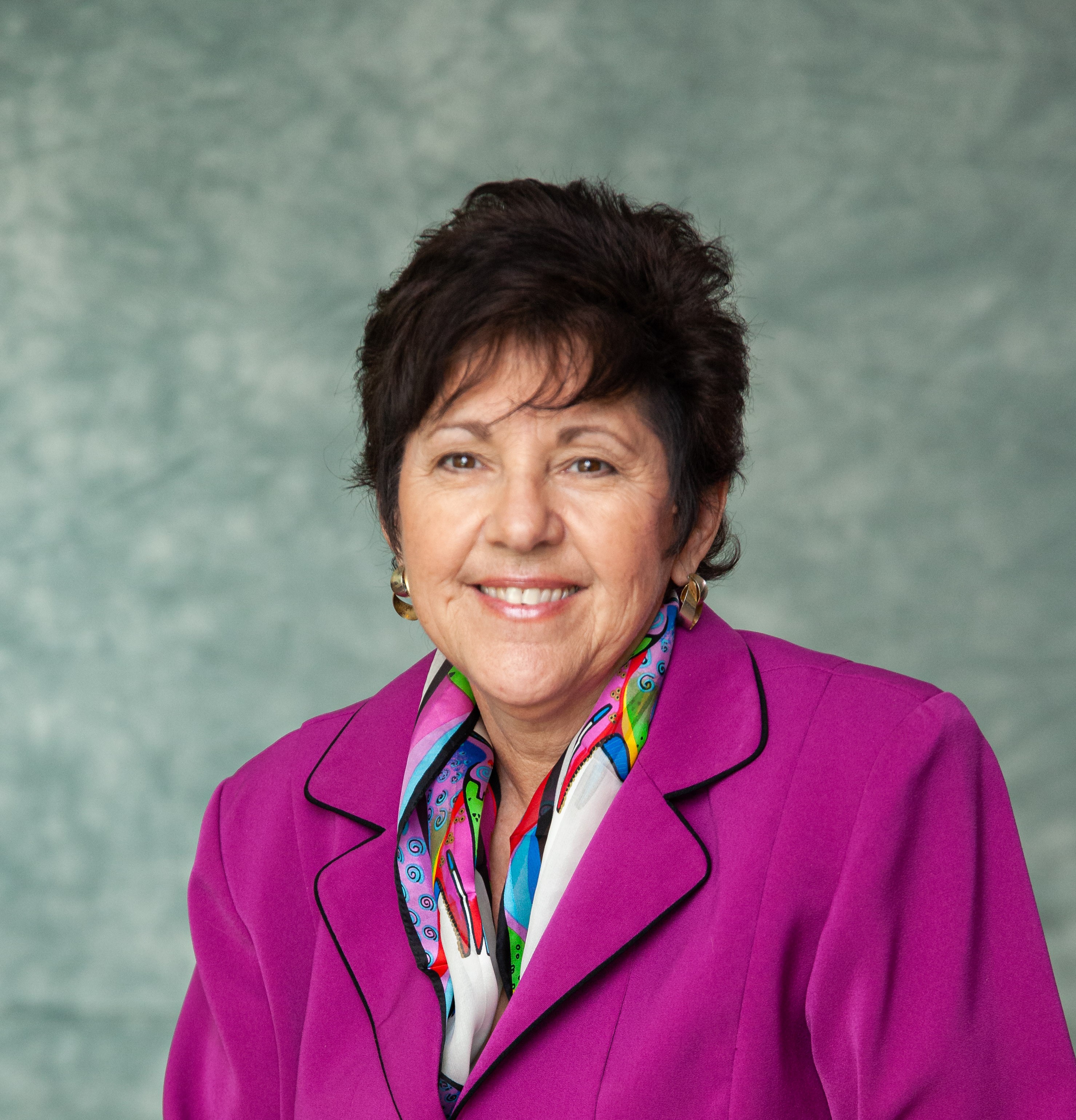 Lorie Weber, MS, PA-C
Lorie Weber, MS, PA-C
Assistant Professor
Read Bio -
 Ami Mikhail, MMS, PA-C
Ami Mikhail, MMS, PA-C
Assistant Professor/Clinical Coordinator
Read Bio -
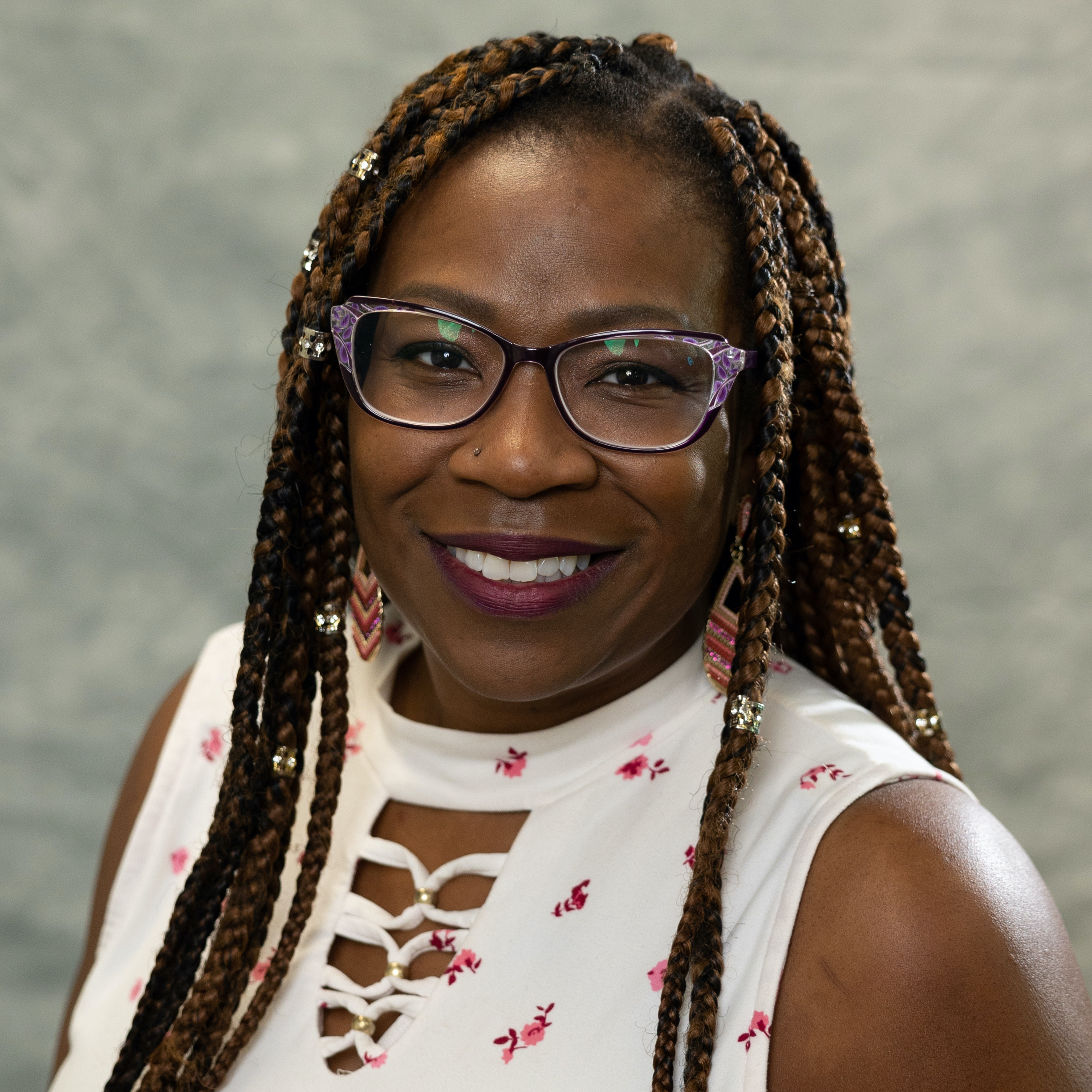 Sabrina Finklea-Strickland,
Sabrina Finklea-Strickland,
MSN, FNP-BC, PHN, FCN
Assistant Professor/Clinical Coordinator
-
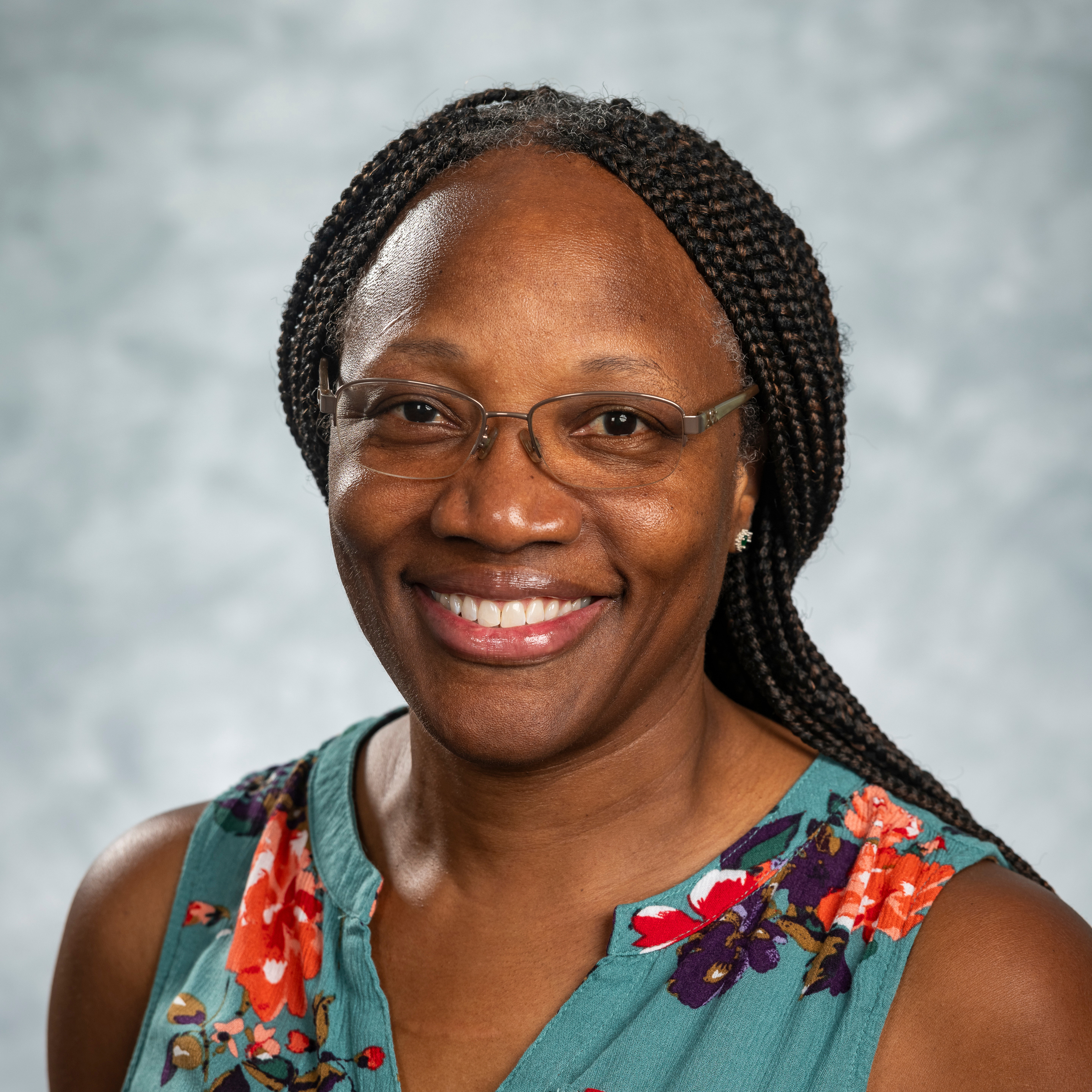 Sylvia Dory, MMS, PA-C
Sylvia Dory, MMS, PA-C
Assistant Professor/Clinical Coordinator
Read Bio -
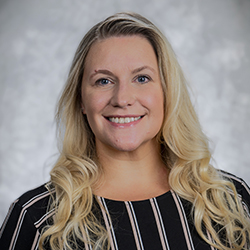 Sarah Walsh, PA-C MSPA
Sarah Walsh, PA-C MSPA
Assistant Professor
Read Bio -
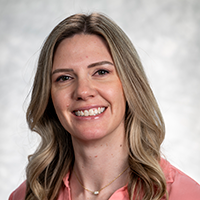 Sara Jiron, PA-C, MPAS
Sara Jiron, PA-C, MPAS
Assistant Professor/Clinical Coordinator
Read Bio -
 Lana Khatib, MPH, MSPAS, PA-C
Lana Khatib, MPH, MSPAS, PA-C
Assistant Professor
Read Bio -
 Alaina Vacco, MMS, PA-C
Alaina Vacco, MMS, PA-C
Clinical Coordinator
Read Bio -
 Victoria Smith, PA-C
Victoria Smith, PA-C
Assistant Professor
Read Bio -
 Courtney Winters, MMS, PA-C
Courtney Winters, MMS, PA-C
Clinical Coordinator, Assistant Professor
Read Bio
-
-
Staff +
-
-
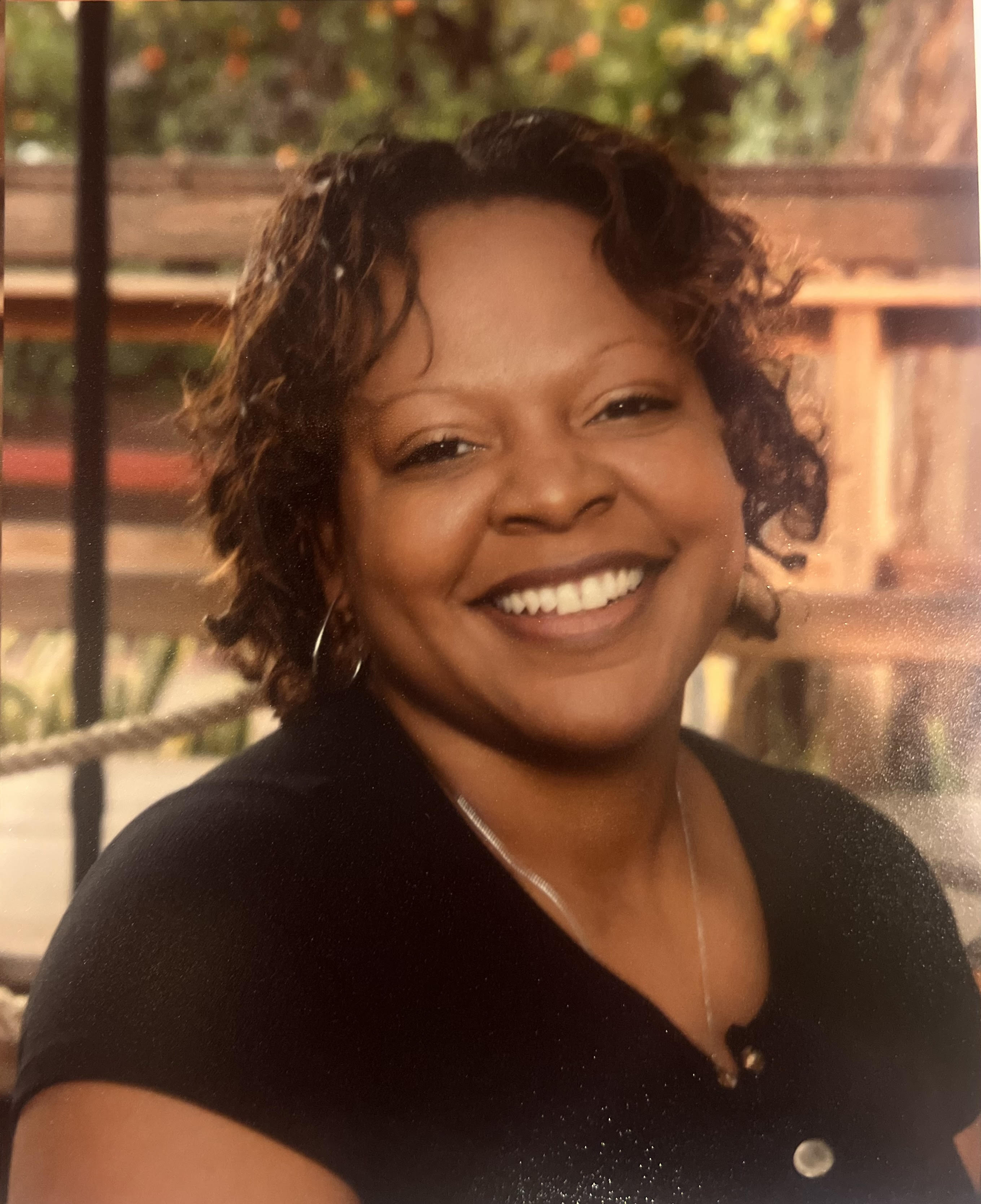 Rashida Grayson
Rashida Grayson
Program Manager
Read Bio -
 Cindy Becerra
Cindy Becerra
Manager of Assessment and Technology
Read Bio -
 Bobbi Catton
Bobbi Catton
Curriculum Coordinator
Read Bio -
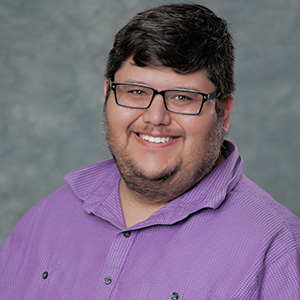 Nick Cross
Nick Cross
Coordinator- PA Assessments
Read Bio -
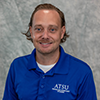 Jesse Thompson, Med, EMT
Jesse Thompson, Med, EMT
Simulation Specialist
Read Bio -
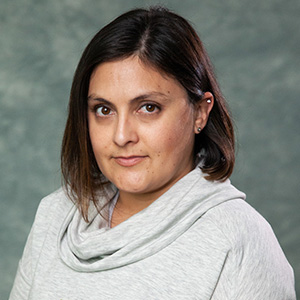 Gina Hirrill-Torres, MS
Gina Hirrill-Torres, MS
Curriculum Coordinator
Read Bio -
 Ezoria Aisuan, MAHS
Ezoria Aisuan, MAHS
Rural Track Project Manager
-
 Annaly Phanhnolath
Annaly Phanhnolath
Clinical Administrative Support
Read Bio -
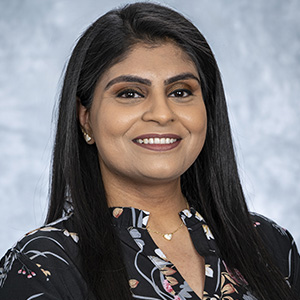 Sunna Khokhar
Sunna Khokhar
Clinical Student Liaison
Read Bio
-
-
Physician Assistant Degree Admissions
Physician Assistant Curriculum Overview +
-
Fall Semester 1
Introduction to Clinical Skills
Credits: 1
Introduction to Clinical Skills is the first of a five part course sequence which provides hands-on training for clinical procedures common in current professional practice. Using low instructor-student ratios and medium- and high-fidelity manikins, students will gain familiarity with a range of clinical procedures while developing their bedside manner and confidence. Team-based care principles will be taught through formative simulation experiences. The Clinical Skills series has been carefully organized to present material system by system to promote interaction of material from parallel courses in the curriculum, i.e. Clinical Medicine, History & Physical, and Body, Mind, Spirit.Clinical Anatomy
Credits: 2
Clinical Anatomy is a review of clinically relevant human anatomy using a regional approach. Lecture and three dimensional laboratory components of this course emphasize the clinical relevance of each anatomical area considered. Nonpathological radiological anatomy is reviewed.Introduction to Biomedical and Clinical Medicine
Credits: 4.5
This course provides a foundation in recognizing the differences between normal and disease states by integrating basic concepts in genetics, molecular biology, microbiology, physiology and pathology. Emphasis is placed on studying the various mechanisms of disease etiology and how they relate to pharmacotherapeutic intervention. Basic pharmacokinetic and pharmacodynamics principles are covered in this course, along with autonomic pharmacology; analgesics; anti-neoplastic agents; and immune-modulating therapies.Introduction to Body-Mind-Spirit Seminar
Credits: 2
The Intro to Body, Mind and Spirit Seminar is the first in a series is a four course series that exposes the student to seminal material germane to the role of the practicing physician assistant. Foundational topics in the following areas will be presented over the four sessions in this course series: Professionalism (including intellectual honesty); Cross Culturalism and Care of Diverse Patient Populations; Bias in Medical Care Delivery; Interprofessional Team Concepts; Healthcare Delivery Systems; Evaluation of the Medical Literature; Concepts of Public Health; Patient Safety and Prevention of Medical Errors; Ethical Practice; Patient and Practitioner Wellness; PA-Physician Team Practice; PA Professional Issues; Development and History of the PA Profession and Spirituality in Medicine.Introduction to Patient Assessment
Credits: 3.5
Introduction to Patient Assessment provides fundamental methods for obtaining and presenting a complete screening medical history and physical examination. Techniques for conducting a physical examination are covered. Instructional methods include lecture, group discussion, role-playing, and labs. Students conduct interviews and physical examinations under supervision. Students are expected to spend additional time outside of class performing physical exams, and preparing for presenting case information and findings.Clinical Medicine: EENT
Credits: 4
The Clinical Medicine series is a twelve course series that provides physician assistant students a systems-based education on health promotion and disease prevention, and patient evaluation, diagnosis, and management across the lifespan. Building upon the material that is presented in the foundations of medicine courses in Fall session 1, each course in the clinical medicine series will provide instruction covering a specific body system, developing an understanding of the pathophysiologic basis of disease (including genetics and molecular mechanisms of disease), generating systems-specific differential diagnoses, ordering and interpreting diagnostic studies, and formulating and implementing pharmacologic and nonpharmacologic treatment plans. Special emphasis will be given to the major principles of pharmacology, including concepts of drug absorption, distribution, metabolism, and elimination. Medications covered will include those most commonly used in the care and treatment of the system-specific conditions.Clinical Medicine: Pulmonology
Credits: 4
The Clinical Medicine series is a twelve course series that provides physician assistant students a systems-based education on health promotion and disease prevention, and patient evaluation, diagnosis, and management across the lifespan. Building upon the material that is presented in the foundations of medicine courses in Fall session 1, each course in the clinical medicine series will provide instruction covering a specific body system, developing an understanding of the pathophysiologic basis of disease (including genetics and molecular mechanisms of disease), generating systems-specific differential diagnoses, ordering and interpreting diagnostic studies, and formulating and implementing pharmacologic and nonpharmacologic treatment plans. Special emphasis will be given to the major principles of pharmacology, including concepts of drug absorption, distribution, metabolism, and elimination. Medications covered will include those most commonly used in the care and treatment of the system-specific conditions.Clinical Medicine: Cardiology
Credits: 8
The Clinical Medicine series is a twelve course series that provides physician assistant students a systems-based education on health promotion and disease prevention, and patient evaluation, diagnosis, and management across the lifespan. Building upon the material that is presented in the foundations of medicine courses in Fall session 1, each course in the clinical medicine series will provide instruction covering a specific body system, developing an understanding of the pathophysiologic basis of disease (including genetics and molecular mechanisms of disease), generating systems-specific differential diagnoses, ordering and interpreting diagnostic studies, and formulating and implementing pharmacologic and nonpharmacologic treatment plans. Special emphasis will be given to the major principles of pharmacology, including concepts of drug absorption, distribution, metabolism, and elimination. Medications covered will include those most commonly used in the care and treatment of the system-specific conditions.History & Physical Examination I
Credits: 2
The History and Physical Examination series is a four course series that provides physician assistant students with techniques of taking a patient history and performing a physical examination. This course will also teach the PA student the proper use of medical diagnostic equipment, selected clinical procedures and effective skills for communicating with patients, their families and other health professionals. Students will learn and practice basic counseling and patient education skills. The courses will include classroom activities, laboratory sessions and clinical experiences.Body, Mind and Spirit I
Credits: 1
The Body, Mind and Spirit Seminar series is a four course series that exposes the student to seminal material germane to the role of the practicing physician assistant. Foundational topics in the following areas will be presented over the four sessions in this course series: Professionalism (including intellectual honesty); Cross Culturalism and Care of Diverse Patient Populations; Bias in Medical Care Delivery; Interprofessional Team Concepts; Healthcare Delivery Systems; Evaluation of the Medical Literature; Concepts of Public Health; Patient Safety and Prevention of Medical Errors; Ethical Practice; Patient and Practitioner Wellness; PA-Physician Team Practice; PA Professional Issues; Development and History of the PA Profession and Spirituality in Medicine.Clinical Medicine Practicum I
Credits: 1
The Clinical Medicine Practicum series is a four course sequence which places students in supervised clinical patient care settings throughout their didactic education in preparation for the clinical year. Students will learn the art of medicine from PAs, physicians, and other healthcare providers in a variety of care environments and specialties.Clinical Skills I
Credits: 1
The Clinical Skills series is a five course sequence which provides hands-on training for clinical procedures common in current professional practice. Using low instructor-student ratios and medium- and high-fidelity manikins, students will gain familiarity with a range of clinical procedures while developing their bedside manner and confidence. Team-based care principles will be taught through formative simulation experiences. All students will obtain ACLS certification during this course sequence.Spring Semester
Clinical Medicine: Healthcare for Special Populations
Credits: 2
The Clinical Medicine series is a twelve course series that provides physician assistant students a systems-based education on health promotion and disease prevention, and patient evaluation, diagnosis, and management across the lifespan. Building upon the material that is presented in the foundations of medicine courses in Fall session 1, each course in the clinical medicine series will provide instruction covering a specific body system, developing an understanding of the pathophysiologic basis of disease (including genetics and molecular mechanisms of disease), generating systems-specific differential diagnoses, ordering and interpreting diagnostic studies, and formulating and implementing pharmacologic and nonpharmacologic treatment plans. Special emphasis will be given to the major principles of pharmacology, including concepts of drug absorption, distribution, metabolism, and elimination. Medications covered will include those most commonly used in the care and treatment of the system-specific conditions.Clinical Medicine: Endocrinology
Credits: 4
The Clinical Medicine series is a twelve course series that provides physician assistant students a systems-based education on health promotion and disease prevention, and patient evaluation, diagnosis, and management across the lifespan. Building upon the material that is presented in the foundations of medicine courses in Fall session 1, each course in the clinical medicine series will provide instruction covering a specific body system, developing an understanding of the pathophysiologic basis of disease (including genetics and molecular mechanisms of disease), generating systems-specific differential diagnoses, ordering and interpreting diagnostic studies, and formulating and implementing pharmacologic and nonpharmacologic treatment plans. Special emphasis will be given to the major principles of pharmacology, including concepts of drug absorption, distribution, metabolism, and elimination. Medications covered will include those most commonly used in the care and treatment of the system-specific conditions.Clinical Medicine: Gastroenterology
Credits: 7
The Clinical Medicine series is a twelve course series that provides physician assistant students a systems-based education on health promotion and disease prevention, and patient evaluation, diagnosis, and management across the lifespan. Building upon the material that is presented in the foundations of medicine courses in Fall session 1, each course in the clinical medicine series will provide instruction covering a specific body system, developing an understanding of the pathophysiologic basis of disease (including genetics and molecular mechanisms of disease), generating systems-specific differential diagnoses, ordering and interpreting diagnostic studies, and formulating and implementing pharmacologic and nonpharmacologic treatment plans. Special emphasis will be given to the major principles of pharmacology, including concepts of drug absorption, distribution, metabolism, and elimination. Medications covered will include those most commonly used in the care and treatment of the system-specific conditions.History & Physical Examination II
Credits: 2
The History and Physical Examination series is a four course series that provides physician assistant students with techniques of taking a patient history and performing a physical examination. This course will also teach the PA student the proper use of medical diagnostic equipment, selected clinical procedures and effective skills for communicating with patients, their families and other health professionals. Students will learn and practice basic counseling and patient education skills. The courses will include classroom activities, laboratory sessions and clinical experiences.Body, Mind and Spirit II
Credits: 1
The Body, Mind and Spirit Seminar series is a four course series that exposes the student to seminal material germane to the role of the practicing physician assistant. Foundational topics in the following areas will be presented over the four sessions in this course series: Professionalism (including intellectual honesty); Cross Culturalism and Care of Diverse Patient Populations; Bias in Medical Care Delivery; Interprofessional Team Concepts; Healthcare Delivery Systems; Evaluation of the Medical Literature; Concepts of Public Health; Patient Safety and Prevention of Medical Errors; Ethical Practice; Patient and Practitioner Wellness; PA-Physician Team Practice; PA Professional Issues; Development and History of the PA Profession and Spirituality in Medicine.Clinical Medicine Practicum II
Credits: 1
The Clinical Medicine Practicum series is a four course sequence which places students in supervised clinical patient care settings throughout their didactic education in preparation for the clinical year. Students will learn the art of medicine from PAs, physicians, and other healthcare providers in a variety of care environments and specialties.Clinical Skills II
Credits: 1
The Clinical Skills series is a five course sequence which provides hands-on training for clinical procedures common in current professional practice. Using low instructor-student ratios and medium- and high-fidelity manikins, students will gain familiarity with a range of clinical procedures while developing their bedside manner and confidence. Team-based care principles will be taught through formative simulation experiences. All students will obtain ACLS certification during this course sequence.Clinical Medicine: Musculoskeletal
Credits: 5
The Clinical Medicine series is a twelve course series that provides physician assistant students a systems-based education on health promotion and disease prevention, and patient evaluation, diagnosis, and management across the lifespan. Building upon the material that is presented in the foundations of medicine courses in Fall session 1, each course in the clinical medicine series will provide instruction covering a specific body system, developing an understanding of the pathophysiologic basis of disease (including genetics and molecular mechanisms of disease), generating systems-specific differential diagnoses, ordering and interpreting diagnostic studies, and formulating and implementing pharmacologic and nonpharmacologic treatment plans. Special emphasis will be given to the major principles of pharmacology, including concepts of drug absorption, distribution, metabolism, and elimination. Medications covered will include those most commonly used in the care and treatment of the system-specific conditions.Clinical Medicine: Neurology
Credits: 5
The Clinical Medicine series is a twelve course series that provides physician assistant students a systems-based education on health promotion and disease prevention, and patient evaluation, diagnosis, and management across the lifespan. Building upon the material that is presented in the foundations of medicine courses in Fall session 1, each course in the clinical medicine series will provide instruction covering a specific body system, developing an understanding of the pathophysiologic basis of disease (including genetics and molecular mechanisms of disease), generating systems-specific differential diagnoses, ordering and interpreting diagnostic studies, and formulating and implementing pharmacologic and nonpharmacologic treatment plans. Special emphasis will be given to the major principles of pharmacology, including concepts of drug absorption, distribution, metabolism, and elimination. Medications covered will include those most commonly used in the care and treatment of the system-specific conditions.History & Physical Examination III
Credits: 2
The History and Physical Examination series is a four course series that provides physician assistant students with techniques of taking a patient history and performing a physical examination. This course will also teach the PA student the proper use of medical diagnostic equipment, selected clinical procedures and effective skills for communicating with patients, their families and other health professionals. Students will learn and practice basic counseling and patient education skills. The courses will include classroom activities, laboratory sessions and clinical experiences.Body, Mind and Spirit III
Credits: 1
The Body, Mind and Spirit Seminar series is a four course series that exposes the student to seminal material germane to the role of the practicing physician assistant. Foundational topics in the following areas will be presented over the four sessions in this course series: Professionalism (including intellectual honesty); Cross Culturalism and Care of Diverse Patient Populations; Bias in Medical Care Delivery; Interprofessional Team Concepts; Healthcare Delivery Systems; Evaluation of the Medical Literature; Concepts of Public Health; Patient Safety and Prevention of Medical Errors; Ethical Practice; Patient and Practitioner Wellness; PA-Physician Team Practice; PA Professional Issues; Development and History of the PA Profession and Spirituality in Medicine.Clinical Medicine Practicum III
Credits: 1
The Clinical Medicine Practicum series is a four course sequence which places students in supervised clinical patient care settings throughout their didactic education in preparation for the clinical year. Students will learn the art of medicine from PAs, physicians, and other healthcare providers in a variety of care environments and specialties.Clinical Skills III
Credits: 1
The Clinical Skills series is a five course sequence which provides hands-on training for clinical procedures common in current professional practice. Using low instructor-student ratios and medium- and high-fidelity manikins, students will gain familiarity with a range of clinical procedures while developing their bedside manner and confidence. Team-based care principles will be taught through formative simulation experiences. All students will obtain ACLS certification during this course sequence.Summer
Clinical Medicine: Dermatology
Credits: 2
The Clinical Medicine series is a twelve course series that provides physician assistant students a systems-based education on health promotion and disease prevention, and patient evaluation, diagnosis, and management across the lifespan. Building upon the material that is presented in the foundations of medicine courses in Fall session 1, each course in the clinical medicine series will provide instruction covering a specific body system, developing an understanding of the pathophysiologic basis of disease (including genetics and molecular mechanisms of disease), generating systems-specific differential diagnoses, ordering and interpreting diagnostic studies, and formulating and implementing pharmacologic and nonpharmacologic treatment plans. Special emphasis will be given to the major principles of pharmacology, including concepts of drug absorption, distribution, metabolism, and elimination. Medications covered will include those most commonly used in the care and treatment of the system-specific conditions.Clinical Medicine: Behavioral Health
Credits: 4
The Clinical Medicine series is a twelve course series that provides physician assistant students a systems-based education on health promotion and disease prevention, and patient evaluation, diagnosis, and management across the lifespan. Building upon the material that is presented in the foundations of medicine courses in Fall session 1, each course in the clinical medicine series will provide instruction covering a specific body system, developing an understanding of the pathophysiologic basis of disease (including genetics and molecular mechanisms of disease), generating systems-specific differential diagnoses, ordering and interpreting diagnostic studies, and formulating and implementing pharmacologic and nonpharmacologic treatment plans. Special emphasis will be given to the major principles of pharmacology, including concepts of drug absorption, distribution, metabolism, and elimination. Medications covered will include those most commonly used in the care and treatment of the system-specific conditions.Clinical Medicine Practicum IV
Credits: 0.5
The fourth course in this series will prepare students for the clinical year through a series of orientation lectures, end of didactic PACKRAT and summative examinations, and lectures on evidence based medicine and literature review in preparation for the capstone project.Clinical Skills IV
Credits: 0.5
The Clinical Skills series is a five course sequence which provides hands-on training for clinical procedures common in current professional practice. Using low instructor-student ratios and medium- and high-fidelity manikins, students will gain familiarity with a range of clinical procedures while developing their bedside manner and confidence. Team-based care principles will be taught through formative simulation experiences. All students will obtain ACLS certification during this course sequence.Fall Semester 2
Clinical Medicine: Nephrology & Urology
Credits: 3.5
The Clinical Medicine series is a twelve course series that provides physician assistant students a systems-based education on health promotion and disease prevention, and patient evaluation, diagnosis, and management across the lifespan. Building upon the material that is presented in the foundations of medicine courses in Fall session 1, each course in the clinical medicine series will provide instruction covering a specific body system, developing an understanding of the pathophysiologic basis of disease (including genetics and molecular mechanisms of disease), generating systems-specific differential diagnoses, ordering and interpreting diagnostic studies, and formulating and implementing pharmacologic and nonpharmacologic treatment plans. Special emphasis will be given to the major principles of pharmacology, including concepts of drug absorption, distribution, metabolism, and elimination. Medications covered will include those most commonly used in the care and treatment of the system-specific conditions.History & Physical Examination IV
Credits: 1
The History and Physical Examination series is a four course series that provides physician assistant students with techniques of taking a patient history and performing a physical examination. This course will also teach the PA student the proper use of medical diagnostic equipment, selected clinical procedures and effective skills for communicating with patients, their families and other health professionals. Students will learn and practice basic counseling and patient education skills. The courses will include classroom activities, laboratory sessions and clinical experiences.Clinical Medicine: Women's Health
Credits: 3.5
Clinical experiences will average approximately 40 hours/week on site, in patient related care. Some clinical experiences may involve slightly shorter (no less than 36 hours/week) or longer hours (no more than 80 hours/week), evening, weekend or on-call responsibilities. The preceptor or clinical site will determine the student’s on-site schedule and clinical responsibilities. Students must adhere to each clinical experience schedule and to all assignments developed by the preceptor. If this is not possible in any given week at a specific clinical site, the student is to notify the clinical team in advance. Patient related care includes evaluating and treating patients, charting and appropriate paperwork (written or electronic), case presentations, discussions with the preceptor, and other duties as applicable.Clinical Medicine: Infectious Disease
Credits: 1
This course integrates information on the biological and molecular nature of causative organisms, diagnostics, treatments and prevention strategies. A review of common infectious disease presented in previous Clinical Medicine courses will be emphasized along with infectious disease topics related to the concurrent enrollment in Nephrology/Urology (MSPA5150) and Women’s Health (MSPA5145) courses.Clinical Medicine Practicum V
Credits: 0.5
This is a continuation of Clinical Medicine Practicum IV. Students will be challenged to integrate their didactic learning with clinical patient care experiences from the previous practicum courses in a series of culminating activities in preparation for the clinical component of the program. Cognitive knowledge and affective skills will be measured through written and practical examinations, student presentations, and oral examinations similar to experiences students will encounter in the clinical year, as well as later in actual practice.Clinical Skills V
Credits: 0.5
The Clinical Skills series is a five-course sequence which provides hands-on training for clinical procedures common in current professional practice. Using low instructor-student ratios and medium- and high-fidelity manikins, students will gain familiarity with a range of clinical procedures while developing their bedside manner and confidence. Team-based care principles will be taught through formative simulation experiences.Clinical Year
Elective
Credits: 3.33
Students will have the opportunity to complete an elective experience in an area of interest from the list of active preceptors in the program’s clinical database. Students are welcome to suggest a clinical site outside of the program’s available list that is consistent with the Department’s mission and within the current established geographic clinical locations (in Metro Phoenix or active CHC campuses). The program must approve all clinical experiences.Family Medicine
Credits: 6.68
Clinical experiences will average approximately 40 hours/week on site, in patient related care. Some clinical experiences may involve slightly shorter (no less than 36 hours/week) or longer hours (no more than 80 hours/week), evening, weekend or on-call responsibilities. The preceptor or clinical site will determine the student’s on-site schedule and clinical responsibilities. Students must adhere to each clinical experience schedule and to all assignments developed by the preceptor. If this is not possible in any given week at a specific clinical site, the student is to notify the clinical team in advance. Patient related care includes evaluating and treating patients, charting and appropriate paperwork (written or electronic), case presentations, discussions with the preceptor, and other duties as applicable.Internal Medicine
Credits: 6.68
Clinical experiences will average approximately 40 hours/week on site, in patient related care. Some clinical experiences may involve slightly shorter (no less than 36 hours/week) or longer hours (no more than 80 hours/week), evening, weekend or on-call responsibilities. The preceptor or clinical site will determine the student’s on-site schedule and clinical responsibilities. Students must adhere to each clinical experience schedule and to all assignments developed by the preceptor. If this is not possible in any given week at a specific clinical site, the student is to notify the clinical team in advance. Patient related care includes evaluating and treating patients, charting and appropriate paperwork (written or electronic), case presentations, discussions with the preceptor, and other duties as applicable.Pediatrics
Credits: 3.33
Clinical experiences will average approximately 40 hours/week on site, in patient related care. Some clinical experiences may involve slightly shorter (no less than 36 hours/week) or longer hours (no more than 80 hours/week), evening, weekend or on-call responsibilities. The preceptor or clinical site will determine the student’s on-site schedule and clinical responsibilities. Students must adhere to each clinical experience schedule and to all assignments developed by the preceptor. If this is not possible in any given week at a specific clinical site, the student is to notify the clinical team in advance. Patient related care includes evaluating and treating patients, charting and appropriate paperwork (written or electronic), case presentations, discussions with the preceptor, and other duties as applicable.Emergency Medicine
Credits: 3.33
Clinical experiences will average approximately 40 hours/week on site, in patient related care. Some clinical experiences may involve slightly shorter (no less than 36 hours/week) or longer hours (no more than 80 hours/week), evening, weekend or on-call responsibilities. The preceptor or clinical site will determine the student’s on-site schedule and clinical responsibilities. Students must adhere to each clinical experience schedule and to all assignments developed by the preceptor. If this is not possible in any given week at a specific clinical site, the student is to notify the clinical team in advance. Patient related care includes evaluating and treating patients, charting and appropriate paperwork (written or electronic), case presentations, discussions with the preceptor, and other duties as applicable.Surgery
Credits: 3.33
Clinical experiences will average approximately 40 hours/week on site, in patient related care. Some clinical experiences may involve slightly shorter (no less than 36 hours/week) or longer hours (no more than 80 hours/week), evening, weekend or on-call responsibilities. The preceptor or clinical site will determine the student’s on-site schedule and clinical responsibilities. Students must adhere to each clinical experience schedule and to all assignments developed by the preceptor. If this is not possible in any given week at a specific clinical site, the student is to notify the clinical team in advance. Patient related care includes evaluating and treating patients, charting and appropriate paperwork (written or electronic), case presentations, discussions with the preceptor, and other duties as applicable.Behavioral Health
Credits: 3.33
Clinical experiences will average approximately 40 hours/week on site, in patient related care. Some clinical experiences may involve slightly shorter (no less than 36 hours/week) or longer hours (no more than 80 hours/week), evening, weekend or on-call responsibilities. The preceptor or clinical site will determine the student’s on-site schedule and clinical responsibilities. Students must adhere to each clinical experience schedule and to all assignments developed by the preceptor. If this is not possible in any given week at a specific clinical site, the student is to notify the clinical team in advance. Patient related care includes evaluating and treating patients, charting and appropriate paperwork (written or electronic), case presentations, discussions with the preceptor, and other duties as applicable.Selective 1
Credits: 3.33
This four-week clinical experience is student-selected. Students may choose from the provided list. The clinical team must approve selectives, and preceptors must be licensed healthcare professionals. The experience gives students an opportunity to enhance an area of interest and/or to explore a potential location for future clinical practice. Generally, selective clinical experiences are scheduled later in the clinical year of study.Selective 2
Credits: 3.33
This four-week clinical experience is student-selected. Students may choose from the provided list. The clinical team must approve selectives, and preceptors must be licensed healthcare professionals. The experience gives students an opportunity to enhance an area of interest and/or to explore a potential location for future clinical practice. Generally, selective clinical experiences are scheduled later in the clinical year of study.Transition to Practice I
Credits: 0.25
This course is ongoing through the clinical year. It includes testing, Objective Structured Clinical Encounter (OSCE) and practical examinations, SOAP note assignments, summative evaluation, and preparation for the PANCE. Topics to prepare the student for practice as a licensed healthcare professional are covered including state licensure, DEA, malpractice, billing and coding, residencies and graduate PA training.Transition to Practice II
Credits: 0.25
This course is ongoing through the clinical year. It includes testing, Objective Structured Clinical Encounter (OSCE) and practical examinations, SOAP note assignments, summative evaluation, and preparation for the PANCE. Topics to prepare the student for practice as a licensed healthcare professional are covered including state licensure, DEA, malpractice, billing and coding, residencies and graduate PA training.Transition to Practice III
Credits: 0.25
This course is ongoing through the clinical year. It includes testing, Objective Structured Clinical Encounter (OSCE) and practical examinations, SOAP note assignments, summative evaluation, and preparation for the PANCE. Topics to prepare the student for practice as a licensed healthcare professional are covered including state licensure, DEA, malpractice, billing and coding, residencies and graduate PA training.Transition to Practice IV
Credits: 2
This course is ongoing through the clinical year. It includes testing, Objective Structured Clinical Encounter (OSCE) and practical examinations, SOAP note assignments, summative evaluation, and preparation for the PANCE. Topics to prepare the student for practice as a licensed healthcare professional are covered including state licensure, DEA, malpractice, billing and coding, residencies and graduate PA training.Transition to Practice V
Credits: 0.25
This course is ongoing through the clinical year. It includes testing, Objective Structured Clinical Encounter (OSCE) and practical examinations, SOAP note assignments, summative evaluation, and preparation for the PANCE. Topics to prepare the student for practice as a licensed healthcare professional are covered including state licensure, DEA, malpractice, billing and coding, residencies and graduate PA training.
-
Requirements +
-
Prerequisite Coursework
Applicants to the residential Master of Science in Physician Assistant Studies program must meet the following requirements before matriculation. All prerequisite coursework must be completed at an institution accredited by a U.S. Department of Education-recognized accreditor. Course and transcript equivalency evaluations will not be accepted. To qualify for admission to the ATSU-ASHS PA Program, candidates must hold a baccalaureate degree or higher from an accredited institution and have completed all prerequisite courses with a grade of ‘C’ or higher before the program begins.
Please review the FAQ section for more specific information.
- Human Anatomy with lab (recommended that course be completed within 5 years of application date), minimum 4 semester credits/6 quarter credits.
- Human Physiology with lab (recommended that course be completed within 5 years of application date), minimum 4 semester credits/6 quarter credits.
- If you have taken a combined Anatomy & Physiology course, you must have two or more semesters (each with lab) totaling 8 semester credits/12 quarter credits.
- Microbiology (with or without lab; recommended that course be completed within 5 years of application date) minimum 3 credits/4 quarter credits.
- Biochemistry (with or without lab; recommended that course be completed within 5 years of application date), minimum 3 semester credits/4 quarter credits.
- General chemistry (with or without lab; recommended that course be completed within 5 years of application date), minimum 4 semester credits/6 quarter credits.
- Psychology, minimum 3 semester credits/4 quarter credits
- College Statistics (i.e. intro course, business stats, psych stats), minimum 3 semester credits/4 quarter credits
- English composition minimum 6 semester credits/8 quarter credits OR English composition minimum 3 semester credits/4 quarter credits AND English elective, minimum 3 semester credits/4 quarter credits
- Medical Terminology, minimum 1 semester/1 quarter credits (certificate does not count must be on transcript from college/university)
- Applicants must obtain a minimum of 500 hours of patient care experience, sufficient to recognize the physical and psychological demands of dealing with patients and to appreciate the challenges and rewards of being a healthcare professional.
*Due to academic challenges related to Covid-19, we will accept pass/fall for prerequisites but only if letter grades are no longer an option
Recommendations
- A minimum of 100 community service hours is strongly recommended.
- Shadowing with a physician assistant is strongly recommended.
- Upper division science are strongly recommended. (e.g.: genetics, immunology, pathophysiology, cell biology, pharmacology)
- 1000 hours or more of patient care experience is recommended
GPA requirements
The applicant must have achieved a minimum 3.0 cumulative grade point average overall and a minimum 3.0 cumulative science grade point average on a 4.00 scale.
Advanced Standing
No advanced standing is provided
Admissions Timeline and CASPA
Applications must be submitted through the Centralized Application Service for Physician Assistants (www.caspaonline.org). Please refer to the CASPA application instructions for specific details about completing the application, required documents, and processing time.
The CASPA application cycle begins in mid-April of the academic year preceding the year in which the applicant plans to matriculate. Applicants must submit a completed application to CASPA by the Sept. 1 deadline. All secondary applications must be submitted by Oct. 1 to be considered.
Program enrollment is based on a rolling admissions policy. Applications are reviewed in the order in which they are received. Due to limited number of seats in the Program, applicants are encouraged to apply early. Interviews are awarded on a competitive basis. Admission to the program is made based on multiple criteria.
General Admission Requirements
Candidates accepted for admission to the ATSU-ASHS PA Program must hold a baccalaureate degree or higher from an institution accredited by a U.S. Department of Education-recognized accreditor and have completed all prerequisite courses with a grade of ‘C’ or higher before the program begins.
Applicants are expected to be computer literate. All coursework requires extensive computer usage. Accepted applicants will be provided laptop specifications.
Applicants are required to submit three letters of recommendation from professionals:
Please refer to the CASPA application instructions for specific guidelines and requirements for submitting letters of recommendation.- Employer or supervisor
- Health Care Practitioner (Physician, Physician Assistant (Strongly recommended) or Nurse Practitioner)
- Faculty member from whom the applicant has taken a course
Please refer to the CASPA application instructions for detailed submission guidelines.
Once ATSU-ASHS receives a completed CASPA application and determines that minimum requirements are met, the applicant will be notified by email to submit a secondary fee for final processing. Upon receipt of this fee, the application is forwarded to the program for consideration.
NOTE: Applicants are responsible for notifying the Office of Admissions of any changes in their mailing address or email address. All requests for withdrawing an application must be done in writing via email, fax, or letter.
Applicants are encouraged to check all email folders in the rare event our email is filtered into a spam or junk mail folder.
If you are accepted into the ATSU PA Program, before matriculating you will be required to complete a criminal background check. Depending on the nature of the incidents uncovered, the results of the background check could potentially affect your acceptance into the program, disqualify you from clinical rotations in certain locations leading to an inability to complete your education, or prohibit professional licensure in certain states.
PA program applicants who earned a 3.5 GPA or higher in the ATSU MSBMS program and have met all prerequisite requirements for the ATSU-ASHS PA program are guaranteed an interview.
All students are required to demonstrate proficiency in English when applying to the ATSU-ASHS. You may find information on the methods by which you can demonstrate your English Proficiency in the General Admissions section.
All applicants must be a U.S citizen, Permanent Resident or F1 Visa holder.
Applicants who are considered potential candidates must interview with the ASHS PA program either in person or online.
-
Technical Standards +
-
A candidate for the doctorate or master’s degree at ASHS must possess abilities and skills in seven identified categories including observation; communication; motor; sensory; strength, mobility, and endurance; intellectual, (conceptual, integrative, and quantitative); and behavioral and social. These abilities and skills are defined in the section, “Minimal technical standards for admission and matriculation” available in the ASHS section of the ATSU University Catalog. In addition, the DPAS has additional technical standards that a student must meet, which include:
- Students must be able to observe and participate in all demonstrations, visual presentations in lectures and laboratories, and computer assisted instruction. In addition, students must be able to observe laboratory evidence and microbiologic cultures, microscopic studies of microorganisms and tissues in normal and pathologic states.
- Students must be able to observe patients accurately and completely, both at a distance and closely. This ability requires functional vision, hearing and somatic sensation.
- Students must be able to problem solve, collect, organize, prioritize, analyze and assimilate large amounts of technically detailed and complex information within a limited time frame. This information will be presented in a variety of educational settings, including lectures, small group discussions, and individual clinical settings. Students must be able to analyze, integrate, and apply this information appropriately for problem solving and decision-making.
- Students must be able to comprehend three dimensional relationships and the spatial relationships of structures.
- Students must have sufficient use of the senses of vision, hearing and smell necessary in order to elicit information, perceive nonverbal communications, and describe changes in mood, activity and posture in addition to the psychomotor abilities to allow the performance of all skills/tests in the physical exam. Students must be able to perform inspection, palpation, auscultation and percussion.
- Students must be able to relate to patients and family members and establish an empathetic, professional and effective relationship with patients and families including not only speech but reading and writing. ATSU DPAS Residential Student Program Guide 50 of 75
- Students are expected to be able to communicate the results of the examination to the patient and to their colleagues with accuracy, clarity, and efficiency in oral, written and electronic formats.
- Students are expected to possess the ability to work collaboratively with all members of the healthcare team.
- Students must have motor function sufficient to execute movements reasonably required to provide general care and emergency treatment to patients. Such skills require coordination of gross and fine muscular movements, equilibrium and sensation.
- Students should be able to manipulate equipment and instruments to perform basic laboratory tests and procedures required to attain curricular goals (e.g. needles, stethoscope, ophthalmoscope, tongue blades, intravenous equipment, gynecologic speculum, and scalpel).
- Students must be able to transport themselves from one location to another in a timely fashion in order to facilitate patient care responsibilities and to receive educational training.
- Students must have the emotional health to fully use their intellectual ability, exercise good judgment, and complete all responsibilities attendant to the diagnosis and care of patients.
- Students must be able to tolerate physical, mental, and emotional stress in training and continue to function effectively.
- Students must possess qualities of adaptability, flexibility and be able to function in the face of uncertainty. He/she must have a high level of compassion for others, motivation to serve, integrity, and a consciousness of social values.
- Students must possess sufficient interpersonal skills to interact positively with people from all levels of society, all ethnic backgrounds, and all belief systems.
- Students must be able to accept criticism and respond by appropriate modification of behavior.
- Students are expected to be able to display appropriate judgment in the assessment and treatment of patients. In addition, students must be able to learn and demonstrate the ability to recognize limitations in their knowledge, skills and abilities and to seek appropriate assistance with their identified limitations.
- Students are expected to possess perseverance, diligence, and consistency to complete the physician assistant curriculum and enter into the practice of medicine as a certified and licensed physician assistant.
-
Application +
-

The ATSU-ASHS PA program participates in the Central Application Service for Physician Assistants (CASPA). CASPA provides a web-based service that allows applicants to submit a single application to multiple participating PA programs. All official transcripts and letters of reference are sent directly to CASPA as part of the application process. Please visit CASPA at http://caspa.cas.myliaison.com/ for more information on how to apply for admission.
Program enrollment is based on a rolling admissions policy. Applications are reviewed in the order in which they are received, thus applicants are encouraged to apply early.
Once ATSU-ASHS receives a completed CASPA application and determines that minimum requirements are met, the applicant is notified by email to submit a secondary fee of $70 for final processing. Upon receipt of this fee, the application then receives full consideration by the PA program.Virtual interviews may be utilized during this interview cycle.
Call 866.626.2878 or email admissions@atsu.edu to learn more about the Physician Assistant program.
-
Financial Aid+
-
University
Requests for information regarding loans and other financial assistance can be found on our Enrollment Services website.
Other
Many Community Health Centers (CHCs) offer loan repayment for graduate PAs who choose to serve in their organizations.
There are also numerous opportunities for PAs to serve in underserved geographic areas (for example, please see National Health Service Corps).
There are also opportunities through state organizations, such as The Arizona State Association of Physician Assistants
-
Program Required Graduate Competencies+
-
-
Clinical and Technical Skills (CTS)
- Gather essential and accurate information about patients and their health status through history taking, physical examination, and the use of laboratory data, imaging, and other diagnostic modalities
- Demonstrate the ability to safely and accurately perform medical technical skills appropriate to the clinical setting.
-
Clinical Reasoning and Problem- Solving Abilities (CRPS)
- Distinguish between acute, chronic, and emergent disease states across the lifespan.
- Apply evidence based and emerging principles of clinical science to diagnostic and therapeutic decision making, and clinical problem solving.
- Recognize the social determinants of health affecting the individuals and community being served, and incorporate them into prevention, evaluation, management, and health maintenance of the patient.
- Demonstrate the ability to identify, assess, and interpret genetic risk factors in patients to inform clinical decision-making, patient education, and personalized care plans.
- Provide timely and safe patient care.
- Identify etiologies, risk factors, pathophysiology, and epidemiology for diagnosis, management, and patient education.
- Based on medical history, physical examination, and diagnostic findings, formulate a plan for management of general medical and surgical conditions, as they present across the lifespan, including pharmacologic and non-pharmacologic treatment modalities.
-
Interpersonal Skills (IPS)
- Demonstrate interpersonal and communication skills that result in effective patient education, and intentionally collaborate with members of the healthcare team.
- Demonstrate the ability to provide effective verbal and nonverbal communication with patients, avoid discipline-specific terminology when possible, and check to ensure patient understanding.
- Counsel and educate patients to empower them to participate in their care and enable shared decision making.
- Provide medical care that is respectful, ethical, considerate, empathetic, and equitable.
- Review medical records, complete written documentation, and communicate diagnostic findings and management strategies in a timely manner.
-
Medical Knowledge (MK)
- For patients of all ages, recognize the difference between the normal and the abnormal health states across all organ systems.
- Demonstrate knowledge of the anatomy, disease etiology, pathophysiology, clinical manifestations, differential diagnoses, management, and appropriate interventions for general medical and surgical conditions across the lifespan.
- Order and Interpret appropriate laboratory data, imaging studies, and other diagnostic tests for general clinical practice
- Describe and apply appropriate interventions for prevention of disease and health promotion/maintenance
- Describe, order, and/or perform appropriate screening methods to detect conditions in an asymptomatic individual.
- Make appropriate informed decisions about diagnostic and therapeutic interventions based on patient information and preferences, up-to-date scientific evidence, and clinical judgment.
-
Professional Behaviors (PB)
- Show respect for the patient's dignity and privacy while maintaining confidentiality during the examination.
- Accurately articulate one’s role and responsibilities to the patient, their family, and other professionals.
- Apply the core principles of medical ethics to medical and health care decisions.
- Demonstrates effective time management by keeping clinical interviews or tasks on track.
- Provides empathetic support by expressing concern, demonstrating understanding, and offering appropriate assistance to patients.
-
Clinical and Technical Skills (CTS)
-
FAQs+
-
- What degree does the ATSU PA program offer? Graduating students receive a master of science degree in physician assistant studies.
- How long is the ASHS PA program, and when does it start? ATSU-ASHS’ PA program is 26 months in length. Courses will begin annually in July. The first 14 month component of the program is divided into two and a half semesters of didactic and laboratory work, while the second 12 month component consists of clinical rotations. During the clinical rotation component, students complete a capstone paper/project.
- What courses are required for completion of the PA program and how many credits does each course carry? Please refer to the ATSU University Catalog.
- Must I have a bachelor’s degree to enter the program? Yes.
- How do I apply to the PA program? Completed applications must be submitted to the Centralized Application Service for Physician Assistants (www.caspaonline.org). Please refer to the CASPA application instructions for specific details about completing the application, required documents, and processing time. The CASPA application cycle begins Mid-April of the academic year preceding the year in which the applicant plans to matriculate. Program enrollment is based on a rolling admissions policy. Applications are reviewed in the order in which they are received, thus applicants are encouraged to apply early. Applicants are required to submit three letters of recommendation from the professionals listed below to CASPA . (1) Employer or supervisor (2) Health Care Practitioner (Physician, Physician Assistant or Nurse Practitioner), and (3) college or university faculty. Please refer to the CASPA application instructions for specific guidelines and requirements for submitting letters of recommendation. Once ATSU-ASHS receives a completed CASPA application and determines that minimum requirements are met, the applicant will be notified by email to submit a secondary fee for final processing. Upon receipt of this fee, the application is forwarded to the PA Program for consideration. NOTE: Applicants are responsible for notifying the Office of Admissions (admissions@atsu.edu) prior to matriculation for changes in their mailing address or email address. Once accepted, all requests to withdraw must be done in writing via email, fax, or letter to Enrollment Services (enrollmentservices@atsu.edu) and the Office of Admissions. Applicants are encouraged to check all email folders in the rare event our email is filtered into a spam or junk mail folder.
- When are interviews conducted? Interviews will occur from mid-September through January, predominantly on Mondays.
- Do all of my prerequisite courses need to be completed by the time I apply to ATSU-ASHS’ PA program through CASPA? No. It is common for many of our candidates to be finishing one or two pre-requisite courses at the time of application. All prerequisites must be successfully completed before the ASHS PA program begins in July.
- Where do I find out how to pay my secondary fee? If all minimum criteria are met in the primary application, the secondary application will be emailed to the applicant. The applicant will be instructed on how to pay the secondary fee upon submission. ATSU’s secondary application deadline is October 1st.
- Do you have a distance learning option for the entry-level program? No.
- What is the profile of a successful applicant to ATSU-ASHS’ PA program? The successful applicant to the program will have a combination of life, educational and work experience that shows a commitment to patient care and serving the underserved, an understanding of the PA profession, and the ability to perform in a demanding academic and professional setting. Past educational performance, while not necessarily indicative of current abilities, can predict performance in the program. Every attempt should be made to enhance overall and science course GPA prior to application. The didactic phase is extremely demanding and the applicant will benefit by taking rigorous upper division science course loads.
- What does the ATSU-ASHS application review process entail? The ATSU-ASHS PA program utilizes a holistic admissions approach to determine which applicants will be granted an interview for the program. The initial review by the University Admissions Department verifies prerequisites, including the three Letters of Recommendation and that minimum GPAs are met. Once met, a secondary application is sent to the applicants for completion. Once the secondary application has been received, the application is forwarded for the initial review in which automatic weighted scale scores are calculated based on Overall GPA, Science GPA, Science Hours, Number of Healthcare Hours, Number of Hours in Volunteer or Community Service, and Number of Shadowing Hours. Applicants are given preference points for an interview and include individuals from isolated rural, small towns and large towns; Veterans and Active Duty Military; First Generation College; and Economically Disadvantaged Students. Because Hometown Scholars, P2P Scholars and Still Scholars receive an automatic interview, no preference points are provided to the applicant. For more information see Hometown Scholars (see Q12), P2P Scholars (see Q13), Still Scholars (see Q14). After this initial review, applications are forwarded to admissions committee members who evaluate the healthcare hours and positions held in addition to course load, number of upper division courses completed or planned, mission match (i.e., exposure to healthcare in rural settings, volunteering with a variety of medically underserved populations, desire to work and live post-graduation in a rural setting), and review of all letters of recommendation, personal statement and secondary application essay questions. If the admissions committee members reviewers grant an interview, applicants will be notified as described in points 20 and 21 below. Applicants not offered an interview are encouraged to reach out to the University Admissions Department for feedback on improving their application for the following cycle. Once applicants have been granted an interview applicants are assessed by the following process: MMI scores, one-on-one file interview impression, academic performance based on CASPA application, and match to mission.
- Who are Hometown Scholars? Hometown Scholars are individuals who work or volunteer with a Community Health Center (CHC) anywhere in the U.S. This program grants an automatic admissions interview to HTS-endorsed applicants who meet all minimum requirements for entry to ATSU-ASHS’ PA program. If accepted and after successful completion of the didactic year in Mesa, AZ, the program sends HTS students to the endorsing CHC for clinical year training. If the endorsing CHC does not have a training partnership with ATSU-ASHS’ PA program, the student will be assigned to another CHC for clinical year training. For more information go to Hometown Scholar link.
- Who are P2P Scholars? P2P Scholars are individuals who attend an ATSU partner institution within the U.S. This program grants an automatic admissions interview to P2P-endorsed applicants who meet all minimum requirements for entry to ATSU-ASHS’ PA program. If accepted and after successful completion of the didactic year in Mesa, AZ, the student will be assigned to the CHC closest to their endorsing institution for clinical year training. For more information go to P2P Scholar link.
- Who are Still Scholars? Still Scholars are limited to students attending our partner institutions for Still Scholars (Dillard University, North Carolina Central University, and Saint Augustine University). Applications must occur after the sophomore year of undergraduate training at one of those two institutions, but no later than August 1. After successful completion of the didactic year in Mesa, AZ, the program sends Still Scholar students to NC to complete their clinical training. For more information go to Still Scholar link.
- Do community college courses meet admissions prerequisites? Yes, however, it is strongly recommended that the majority of prerequisite courses occur at a four-year institution. Students are also encouraged to demonstrate the ability to handle academic rigor with one or more quarters/semesters with heavier upper division science course loads (15 credits or higher per quarter/semester and greater than seven upper division courses prior to application to the PA program).
- Can I take prerequisites at your institution? ATSU-ASHS does not offer undergraduate courses. An online Masters of Biomedical Sciences degree is available to prePA applicants and some courses offered will meet the following prerequisites for the ATSU-ASHS PA program: Microbiology, Biochemistry, English Elective (Medical Writing), and Physiology. More information about the ATSU-ASHS MSBMS Program can be found here.
- Does it make a difference for admission if I am from out-of-state? No. Your state of residence does not impact your chances for admission.
- Can international students apply to the program? International students can apply if they have received a bachelor’s degree (or higher) from a US regionally accredited institution. All applicants must be a U.S citizen, Permanent Resident or F1 Visa holder.
- How will I be notified if I’m being invited for an interview? The invitation will be made by email; therefore, it is important that you provide us with current contact information.
- When will I be notified if I am selected to interview? You will be notified if you are selected for an interview after your application has been reviewed. The application review process begins in June each year.
- If I am selected to interview, how long does it take to find out if I am selected for the program? We try to inform applicants within two to four weeks after the interview date.
- What is the average GPA of students accepted to the program? For the incoming Class of 2025, the average overall GPA was 3.60, and the average science GPA was 3.55.
- Will I be able to work while I am in school? Because of the rigorous nature of the physician assistant course work, the PA faculty strongly discourages students from working. Typically, PA students are in class from 8:00am - 5:00pm Monday through Friday, with an occasional required weekend or evening hours. In addition, students are not required to work for the PA program. Students eligible for work study positions at A.T. Still University may choose to work for any other program within the University. Enrollment Services issues work study contracts and determines eligibility. The program director ensures that work study students are allowed to use work study, but are not required to work for DPAS.
- Does ATSU-ASHS offer financial aid? Where can I find scholarship information? Yes, we offer financial aid and scholarships to our students. Learn more about financial aid.
- How many people apply to ATSU-ASHS’ PA program each year? In recent years, the program has received over 2,500 applications. We traditionally interview approximately 300+ people. There is no guaranteed number of applications or interviews in any given year.
- How many open positions are available in the ATSU-ASHS’ PA program each year? ATSU-ASHS enrolls 100 students per PA student cohort.
- How many hours of clinical experience do I need? A minimum of 500 hours of health care experience involving patient contact is required. It is important that one is very familiar with the career in which the applicant is planning to make a commitment.
- Is there housing convenient to the University? Yes. Students find housing in many of the neighboring communities. There is no on-campus student housing.
- Can I send my application directly to ATSU? No. You must apply through the centralized application service called CASPA.
- I do not work in the medical field. What type of experience should I get to accumulate hours for “Clinical Experience”? Keep in mind that your goal is to become a physician assistant, therefore, your experience should provide you with as much exposure/experience as possible to the roles and responsibilities of physicians, PA’s and other medical professionals, whose primary responsibility is patient care.
- I have a letter of recommendation by a nurse practitioner, chiropractor or other health professional. Can this count for my healthcare letter of recommendation? The required letter of recommendation from a healthcare provider must be from a physician (M.D. or D.O.), a physician assistant, or a nurse practitioner. A letter from a PA is preferred.
- Can someone from ATSU admissions or ATSU PA faculty review my application, transcripts, reference forms, resume and personal statement before I turn them in? No. Read the PA program’s brochure, catalog and online material very carefully. Everything you need to know is explained in these documents.
- Who is on the PA Admission Committee? Committee members consist of program faculty and practicing physician assistants.
- What are the costs in the PA program? Consult the Finance Office website for the current tuition and costs of the PA program. Please note PA program costs are subject to change upon approval of the University Board of Trustees.
- Can a course in “exercise physiology” satisfy the human anatomy & physiology pre-requisite? No.
- Does your program offer advanced placement or accept transfer credits? The program does not offer advanced placement or transfer credits for advanced standing in the PA program. The program does not accept AP credits for prerequisite courses with the exception of English.
- How do I prepare for the interview? Be yourself. Be prepared. Do your homework regarding the PA profession and ATSU. Practice by asking others to “mock” interview you.
- What is the interview format? Interviews are offered as either in-person or virtual via Zoom platform. Both in person and virtual interviews use a multiple mini-interview format or MMI and a one on one file review session. The MMI format ensures students are not only academically capable but also possess the characteristics associated with success in the program and as a compassionate and knowledgeable graduate PA. Interview sessions also include a Q&A session and time to meet with our current PA students.
- What counts as volunteer experience? We are looking for applicants that are spending time helping people in a community of need or underserved. The volunteer experience does not have to be in healthcare however this is recommended. This does not include a paid position or shadowing. We love animals but we are looking for volunteer service helping people.
- Do you require the GRE? GRE scores are NOT required for admissions consideration.
- Are students required to provide or solicit clinical sites or preceptors? No, per the ARC-PA standards and the program policy, students are not allowed to provide or solicit clinical sites or preceptors. Students are allowed to provide the names of providers interested in precepting and the clinical team will follow up. Students should recognize that it may take months to arrange such an experience, and must observe the following: 1. Students should allow at least six months for the necessary paperwork to be completed. 2. The student is prohibited from contacting the clinical site without first obtaining written permission from the clinical faculty. Once permission has been granted to contact the site, the student completes the Clinical Site Development Request Form. 3. Using information from the Clinical Site Development Request Form, the clinical faculty will evaluate the potential site/preceptor to determine whether or not the site meets program expectations.
- Where can I address any further questions? Contact the admissions office at admissions@atsu.edu or call 866.626.2878.
-
Contact Us +
-
Call 866.626.2878 or email admissions@atsu.edu to learn more about the Physician Assistant program.
-
